#Think this is relevant to the entire cast in a way so
Explore tagged Tumblr posts
Text
Listen. Listen. Hear me out ok.
I LOVEEE Thirteen, Mephisto and Raphael ok, I would die to date any of them.
But the thought of them becoming dateable, as much as I want to date them… not so much, honestly… gives me constant anxiety, like… big time.
I mean the devs couldn’t even handle the SEVEN main love interests in S1 or S2. I mean cmon who doesn’t know how Asmo and Beel were the devs obvious least favourite. There are times where all the brothers get a kiss except Beel or Asmo.
And then when 4 more characters entered the intimacy system, they handled them really good actually, amazing even. S3 was great imo, for the new dateables that was. But again, half of the brothers were forgotten to be love interests. But, they did do the new dateables good.
But then, by S4 they all literally reverted back to being side characters again and not dateables from what I could see.
Diavolo seemed the exact same as he was in S1 and S2 except maybe in one romantic scene with him. Solomon was only playing the role of a teacher and almost nothing more. If you played S4 without S3 context, you wouldn’t have even guessed that they were a dateable. Same goes for Simeon (even though almost the entirety of S4 was centred around him) Barbatos just became a more romantic dateable so, we did get one kiss by the end but… felt really rushed.
And don’t forget before we had the spotlight events how bad, cliche and repetitive the events were? Because we had to make sure we kissed all of them (except luke ofc) so an entire event chapter was dedicated to making sure we spend time and kiss all of them. And then even then there were characters who weren’t kissed or got fair time and treatment.
Finally, in Nightbringer, during S1 Solomon had a lot of spotlight for once and some Diavolo, while Simeon didn’t even exist. When it came to S2, we got Simeon spotlight but Solomon and Diavolo just went -poof- and vanished just like that.
Don’t forget that every near to end of a season, we kiss all the dateables right? And for some very weird reason, we kissed every character, but you know who we didn’t? Diavolo. And what’s even more weird is that, there was no reason not to because we’ve already kissed him previously, and the scene was in perfect timing for an MC option to kiss him, we talked to him, but just didn’t… kiss him? It’s just so… confusing.
Oh right, don’t forget how the brothers went through their special arc or whatever you’d like to name it, with MC who’s helped the brothers through and through of course, so we get to kiss them each at the end, except you know which brothers didn’t? Asmo and Beel. That’s right. Even in Nightbringer the devs never changed. Well, actually, they got even worse. You know who else didn’t get a kiss? Belphie, who we know isn’t the fandoms favourite brother, so of course… no kiss either… that’s now another brother who the devs are starting leaving to the side.
So, the entire game is a current mess and if Solmare couldn’t handle 7 love interests properly, and added 4 to the mix, which upturned everything into chaos, adding another 3 into the dateables section… is it reeaaalllllyyy a good idea? I mean to let the devs handle them…
Again it’s not like I don’t want them to be dateable but just like… how are they going to handle it? You know… considering they actually can’t handle it?
There will have to be more romance in the story, or people would complain, they’d have to fit 15 characters in, and they can’t make the lessons short, which they already do, there’s a chance we’ll get to kiss some while others won’t even get screen time, Thirteen, Raphael, and Mephisto can’t be set to the side during events either otherwise there would be complaints, and there’s no way writers won’t get tired of writing Devilgrams for 15 characters so other characters will be bad, while others who always get the top will have a decent Devilgram story. I bet the writing for almost everything will go into mess…
And that’s my only problem cus I love them and I do want them to become dateable but I also want the game content to be good even though it’s… not… really. Ok ngl it’s already a mess. And that’s just something I feel very anxious about when thinking what’s gonna happen when there are more dateables…
#I also have a feeling one of the 3 won’t get as much attention when they become dateable#I can see any of them being the one who’s left behind#and it worries me…#I also don’t want any of the current cast to not exist anymore#…well not like complaining will do anything hopefully it just doesn’t turn messed up is all I ask for#maybe that’s also too much?#obey me#obey me shall we date#obey me one master to rule them all#obey me nightbringer#obey me nb#obey me swd#Think this is relevant to the entire cast in a way so#obey me lucifer#obey me mammon#obey me leviathan#obey me satan#obey me asmodeus#obey me beelzebub#obey me belphegor#obey me diavolo#obey me barbatos#obey me luke#obey me simeon#obey me solomon#obey me raphael#obey me mephisto#obey me thirteen
69 notes
·
View notes
Text
It would've been hilarious if ShawLuna had tried to cover their asses from the early volume transphobic jokes around Jaune by making him a trans woman. It can't be transphobia if it's ☆~foreshadowing~☆
#rwde#i wish i was at home rn so i could edit that brand margarine tub to 'i cant believe its not transphobia!'#the world if 99% of the rwby cast were trans 🏞🌟🌈#since all of jnpr are genderbent from their allusions theyre all trans. to me#ruby and qrow are trans bc i like them#also them being trans would be an excellent way to showcase how gender stuff works in remnant#i dont think qrow would be able to get a whole lot done w his semblance and all so no surgeries#just him and his hatsune miku binder against the world#but bc he's tried all sorts of things he knows the ins and outs and lets ruby decide which ways she prefers to go#god i miss messing around w ohar but it's such a huge project that i straight up dont have time for#i barely have time for the essay :/ thanks capitalism#im literally 3 seconds away from quitting my job just so i can crunch it in time for the election#i wanna stay sober the entire time im working on this thing and the election will 110% threaten that#plus some of the themes be relevant
13 notes
·
View notes
Text
the hardest part about writing is just putting down any words first because i WANT everything to be planned out fully even though i know when i actually write it out first so i can go back to it, all that is way easier to do or revise later
no planning only write
#txts#like look @me-i know we got multiple ppl doing stuff around everywhere#some who i havent even created#but lets just write down what the main things we gotta get to are w/ the main cast#and worry about the side charaters and furhter actions and plotlines later okay#bc i can't juggle 50 things at once so PLEASE#lets just note down who is going where and doing what and go smaller from there fOR 5 MINUTES I BEG OF THEE#it feels weird doing that bc i am like#nuuuu thats not enough happening thats not enough info#....honey this isnt even a drafts yet this is a vomit of words to get the vibes and basic actions taken right#i literally summed up an entire section as 'political shenanigans' bc i am not about to think on#who interacts with what side in which carefully curated words exactly rn#all i gotta know is-right THEN is the time to write about it and make those characters relevant#and lay the groundwork for when everything crumbles down then bc ofc its bc politics and people being stupid#thats the best part about it#but i just gotta...write it down first in the MOST basic fucking way okay thanks
0 notes
Text
"The subtext that undergirds this new anti-racist discourse—that Black-white relationships are inherently fraught and must be navigated with the help of professionals and technical experts—testifies to the impoverishment of our interracial imagination, not to its enrichment. More gravely, anti-color-blind etiquette treats Black Americans as exotic others, permanent strangers whose racial difference is so chasmic that it must be continually managed, whose mode of humanness is so foreign that it requires white people to adopt a special set of manners and 'race conscious' ritualistic practices to even have a simple conversation."*
*(emphasis mine)
By: Tyler Austin Harper
Published: Aug 14, 2023
The hotel was soulless, like all conference hotels. I had arrived a few hours before check-in, hoping to drop off my bags before I met a friend for lunch. The employees were clearly frazzled, overwhelmed by the sudden influx of several hundred impatient academics. When I asked where I could put my luggage, the guy at the front desk simply pointed to a nearby hallway. “Wait over there with her; he’s coming back.”
Who “he” was remained unclear, but I saw the woman he was referring to. She was white and about my age. She had a conference badge and a large suitcase that she was rolling back and forth in obvious exasperation. “Been waiting long?” I asked, taking up a position on the other side of the narrow hallway. “Very,” she replied. For a while, we stood in silence, minding our phones. Eventually, we began chatting.
The conversation was wide-ranging: the papers we were presenting, the bad A/V at the hotel, our favorite things to do in the city. At some point, we began talking about our jobs. She told me that—like so many academics—she was juggling a temporary teaching gig while also looking for a tenure-track position.
“It’s hard,” she said, “too many classes, too many students, too many papers to grade. No time for your own work. Barely any time to apply to real jobs.”
When I nodded sympathetically, she asked about my job and whether it was tenure-track. I admitted, a little sheepishly, that it was.
“I’d love to teach at a small college like that,” she said. “I feel like none of my students wants to learn. It’s exhausting.”
Then, out of nowhere, she said something that caught me completely off guard: “But I shouldn’t be complaining to you about this. I know how hard BIPOC faculty have it. You’re the last person I should be whining to.”
I was taken aback, but I shouldn’t have been. It was the kind of awkward comment I’ve grown used to over the past few years, as “anti-racism” has become the reigning ideology of progressive political culture. Until recently, calling attention to a stranger’s race in such a way would have been considered a social faux pas. That she made the remark without thinking twice—a remark, it should be noted, that assumes being a Black tenure-track professor is worse than being a marginally employed white one—shows how profoundly interracial social etiquette has changed since 2020’s “summer of racial reckoning.” That’s when anti-racism—focused on combating “color-blindness” in both policy and personal conduct—grabbed ahold of the liberal mainstream.
Though this “reckoning” brought increased public attention to the deep embeddedness of racism in supposedly color-blind American institutions, it also made instant celebrities of a number of race experts and “diversity, equity, and inclusion” (DEI) consultants who believe that being anti-racist means undergoing a “journey” of radical personal transformation. In their righteous crusade against the bad color-blindness of policies such as race-neutral college admissions, these contemporary anti-racists have also jettisoned the kind of good color-blindness that holds that we are more than our race, and that we should conduct our social life according to that idealized principle. Rather than balance a critique of color-blind law and policy with a continuing embrace of interpersonal color-blindness as a social etiquette, contemporary anti-racists throw the baby out with the bathwater. In place of the old color-blind ideal, they have foisted upon well-meaning white liberals a successor social etiquette predicated on the necessity of foregrounding racial difference rather than minimizing it.
As a Black guy who grew up in a politically purple area—where being a good person meant adhering to the kind of civil-rights-era color-blindness that is now passé—I find this emergent anti-racist culture jarring. Many of my liberal friends and acquaintances now seem to believe that being a good person means constantly reminding Black people that you are aware of their Blackness. Difference, no longer to be politely ignored, is insisted upon at all times under the guise of acknowledging “positionality.” Though I am rarely made to feel excessively aware of my race when hanging out with more conservative friends or visiting my hometown, in the more liberal social circles in which I typically travel, my race is constantly invoked—“acknowledged” and “centered”—by well-intentioned anti-racist “allies.”
This “acknowledgement” tends to take one of two forms. The first is the song and dance in which white people not-so-subtly let you know that they know that race and racism exist. This includes finding ways to interject discussion of some (bad) news item about race or racism into casual conversation, apologizing for having problems while white (“You’re the last person I should be whining to”), or inversely, offering “support” by attributing any normal human problem you have to racism.
The second way good white liberals often “center” racial difference in everyday interactions with minorities is by trying, always clumsily, to ensure that their “marginalized” friends and familiars are “culturally” comfortable. My favorite personal experiences of this include an acquaintance who invariably steers dinner or lunch meetups to Black-owned restaurants, and the time that a friend of a friend invited me over to go swimming in their pool before apologizing for assuming that I know how to swim (“I know that’s a culturally specific thing”). It is a peculiar quirk of the 2020s’ racial discourse that this kind of “acknowledgement” and “centering” is viewed as progress.
My point is not that conservatives have better racial politics—they do not—but rather that something about current progressive racial discourse has become warped and distorted. The anti-racist culture that is ascendant seems to me to have little to do with combatting structural racism or cultivating better relationships between white and Black Americans. And its rejection of color-blindness as a social ethos is not a new frontier of radical political action.
No, at the core of today’s anti-racism is little more than a vibe shift—a soft matrix of conciliatory gestures and hip phraseology that give adherents the feeling that there has been a cultural change, when in fact we have merely put carpet over the rotting floorboards. Although this push to center rather than sidestep racial difference in our interpersonal relationships comes from a good place, it tends to rest on a troubling, even racist subtext: that white and Black Americans are so radically different that interracial relationships require careful management, constant eggshell-walking, and even expert guidance from professional anti-racists. Rather than producing racial harmony, this new ethos frequently has the opposite effect, making white-Black interactions stressful, unpleasant, or, perhaps most often, simply weird.
Since the murder of George Floyd in May 2020, progressive anti-racism has centered on two concepts that helped Americans make sense of his senseless death: “structural racism” and “implicit bias.” The first of these is a sociopolitical concept that highlights how certain institutions—maternity wards, police barracks, lending companies, housing authorities, etc.—produce and replicate racial inequalities, such as the disproportionate killing of Black men by the cops. The second is a psychologicalconcept that describes the way that all individuals—from bleeding-heart liberals to murderers such as Derek Chauvin—harbor varying degrees of subconscious racial prejudice.
Though “structural racism” and “implicit bias” target different scales of the social order—institutions on the one hand, individuals on the other—underlying both of these ideas is a critique of so-called color-blind ideology, or what the sociologist Eduardo Bonilla-Silva calls “color-blind racism”: the idea that policies, interactions, and rhetoric can be explicitly race-neutral but implicitly racist. As concepts, both “structural racism” and “implicit bias” rest on the presupposition that racism is an enduring feature of institutional and social life, and that so-called race neutrality is a covertly racist myth that perpetuates inequality. Some anti-racist scholars such as Uma Mazyck Jayakumar and Ibram X. Kendi have put this even more bluntly: “‘Race neutral’ is the new “separate but equal.’” Yet, although anti-racist academics and activists are right to argue that race-neutral policies can’t solve racial inequities—that supposedly color-blind laws and policies are often anything but—over the past few years, this line of criticism has also been bizarrely extended to color-blindness as a personal ethos governing behavior at the individual level.
The most famous proponent of dismantling color-blindness in everyday interactions is Robin DiAngelo, who has made an entire (very condescending) career out of asserting that if white people are not uncomfortable, anti-racism is not happening. “White comfort maintains the racial status quo, so discomfort is necessary and important,” the corporate anti-racist guru advises. Over the past three years, this kind of anti-color-blind, pro-discomfort rhetoric has become the norm in anti-racist discourse. On the final day of the 28-day challenge in Layla Saad’s viral Me and White Supremacy, budding anti-racists are tasked with taking “out-of-your-comfort-zone actions,” such as apologizing to people of color in their life and having “uncomfortable conversations.” Frederick Joseph’s best-selling book The Black Friend takes a similar tack. The problem with color-blindness, Joseph counsels, is it allows “white people to continue to be comfortable.” The NFL analyst Emmanuel Acho wrote an entire book, simply called Uncomfortable Conversations With a Black Man, that admonishes readers to “stop celebrating color-blindness.” And, of course, there are endless how-to guides for having these “uncomfortable conversations” with your Black friends.
Once the dominant progressive ideology, professing “I don’t see color” is now viewed as a kind of dog whistle that papers over implicit bias. Instead, current anti-racist wisdom holds that we must acknowledge racial difference in our interactions with others, rather than assume that race needn’t be at the center of every interracial conversation or encounter. Coming to grips with the transition we have undergone over the past decade—color-blind etiquette’s swing from de rigueur to racist—requires a longer view of an American cultural transition. Civil-rights-era color-blindness was replaced with an individualistic, corporatized anti-racism, one focused on the purification of white psyches through racial discomfort, guilt, and “doing the work” as a road to self-improvement.
Writing in 1959, the social critic Philip Rieff argued that postwar America was transforming from a religious and economic culture—one oriented around common institutions such as the church and the market—to a psychological culture, one oriented around the self and its emotional fulfillment. By the 1960s, Rieff had given this shift a name: “the triumph of the therapeutic,” which he defined as an emergent worldview according to which the “self, improved, is the ultimate concern of modern culture.” Yet, even as he diagnosed our culture with self-obsession, Rieff also noticed something peculiar and even paradoxical. Therapeutic culture demanded that we reflect our self-actualization outward. Sharing our innermost selves with the world—good, bad, and ugly—became a new social mandate under the guise that authenticity and open self-expression are necessary for social cohesion.
Recent anti-racist mantras like “White silence is violence” reflect this same sentiment: exhibitionist displays of “racist” guilt are viewed as a necessary precursor to racial healing and community building. In this way, today’s attacks on interpersonal color-blindness—and progressives’ growing fixation on implicit bias, public confession, and race-conscious social etiquette—are only the most recent manifestations of the cultural shift Rieff described. Indeed, the seeds of the current backlash against color-blindness began decades ago, with the application of a New Age, therapeutic outlook to race relations: so-called racial-sensitivity training, the forefather of today’s equally spurious DEI programming.
In her 2001 book, Race Experts, the historian Elisabeth Lasch-Quinn painstakingly details how racial-sensitivity training emerged from the 1960s’ human-potential movement and its infamous “encounter groups.” As she explains, what began as a more or less countercultural phenomenon was later corporatized in the form of the anemic, pointless workshops controversially lampooned on The Office. Not surprisingly, this shift reflected the ebb and flow of corporate interests: Whereas early workplace training emphasized compliance with the newly minted Civil Rights Act of 1964, later incarnations would focus on improving employee relations and, later still, leveraging diversity to secure better business outcomes.
If there is something distinctive about the anti-color-blind racial etiquette that has emerged since George Floyd’s death, it is that these sites of encounter have shifted from official institutional spaces to more intimate ones where white people and minorities interact as friends, neighbors, colleagues, and acquaintances. Racial-awareness raising is a dynamic no longer quarantined to formalized, compulsory settings like the boardroom or freshman orientation. Instead, every interracial interaction is a potential scene of (one-way) racial edification and supplication, encounters in which good white liberals are expected to be transparent about their “positionality,” confront their “whiteness,” and—if the situation calls for it—confess their “implicit bias.”
In a vacuum, many of the prescriptions advocated by the anti-color-blind crowd are reasonable: We should all think more about our privileges and our place in the world. An uncomfortable conversation or an honest look in the mirror can be precursors to personal growth. We all carry around harmful, implicit biases and we do need to examine the subconscious assumptions and prejudices that underlie the actions we take and the things we say. My objection is not to these ideas themselves, which are sensible enough. No, my objection is that anti-racism offers little more than a Marie Kondo–ism for the white soul, promising to declutter racial baggage and clear a way to white fulfillment without doing anything meaningful to combat structural racism. As Lasch-Quinn correctly foresaw, “Casting interracial problems as issues of etiquette [puts] a premium on superficial symbols of good intentions and good motivations as well as on style and appearance rather than on the substance of change.”
Yet the problem with the therapeutics of contemporary anti-racism is not just that they are politically sterile. When anti-color-blindness and its ideology of insistent “race consciousness” are translated into the sphere of private life—to the domain of friendships, block parties, and backyard barbecues—they assault the very idea of a multiracial society, producing new forms of racism in the process. The fact that our media environment is inundated with an endless stream of books, articles, and social-media tutorials that promise to teach white people how to simply interact with the Black people in their life is not a sign of anti-racist progress, but of profound regression.
The subtext that undergirds this new anti-racist discourse—that Black-white relationships are inherently fraught and must be navigated with the help of professionals and technical experts—testifies to the impoverishment of our interracial imagination, not to its enrichment. More gravely, anti-color-blind etiquette treats Black Americans as exotic others, permanent strangers whose racial difference is so chasmic that it must be continually managed, whose mode of humanness is so foreign that it requires white people to adopt a special set of manners and “race conscious” ritualistic practices to even have a simple conversation.
If we are going to find a way out of the racial discord that has defined American life post-Trump and post-Charlottesville and post-Floyd, we have to begin with a more sophisticated understanding of color-blindness, one that rejects the bad color-blindness on offer from the Republican Party and its partisans, as well as the anti-color-blindness of the anti-racist consultants. Instead, we should embrace the good color-blindness of not too long ago. At the heart of that color-blindness was a radical claim, one imperfectly realized but perfect as an ideal: that despite the weight of a racist past that isn’t even past, we can imagine a world, or at least an interaction between two people, where racial difference doesn’t make a difference.
[ Via: https://archive.today/8zfvc ]
#found this while looking for something else entirely#touches on several ideas ive been percolating on recently in a super interesting relevant way#dovetails with some conversations ive been having with white friends and in therapy as well#really glad i found it#ive been thinking about the theory of like a propensity for overcorrection as part of the work of unlearning and deconstructing#speaking both toward unlearning and deconstructing white supremacy culture but also maladaptive coping mechanisms wrt spiritual healing#and its because the more i learn and read and think about it the more i am starting to think of the two concepts as basically linked#not to get fake deep or anything but i do think it is all connected#whiteness and supremacy culture and capitalism .. all of it alienates us systematically from our communities and like. spiritual wellbeing#its the syllabus for individualism perfectionism right to comfort urgency defensiveness black and white reasoning etc#and is that not literally all the same shit we're all paying thousands of dollars to exhume in years of therapy?#idk man it seems to me like every time i turn over a rock in my healing journey wsc is down there underneath everything else#just like blackrock and vanguard you trace your micro-issue far enough back to the source and behind all the shell corps there it is#it feels almost fantastically reductive like imagine reality being like a brandon sanderson novel with exactly one Big Bad#to fight at the end of every book and maybe finally vanquish by the end of the series#like im trying to be critical of the impulse to over simplify an objectively complicated and nuanced issue#the last thing i want is to cast something as convoluted and deeply violent and traumatising as this in a reductive light#and am trying to navigate this idea without framing white people as the 'real' or 'unsung' victims of wsc#because that certainly is not the case or the argument#this just is a theme that keeps cropping up in my conversations and thoughts about both concepts#something to chew on journal about etc#i have so many more thoughts about this branching off in so many directions but this is not the place for that all though . lol#overcorrection#note to self#angie.txt
12 notes
·
View notes
Text
Ao no Exorcist is a Shonen series written by a woman and it shows
Since the latest chapter, I've been thinking about how several usual Shonen tropes are written rather differently under Kato-sensei's pen. No judgement or anything, it's just cool to observe. Some examples :
1) Rin's mentor is a woman
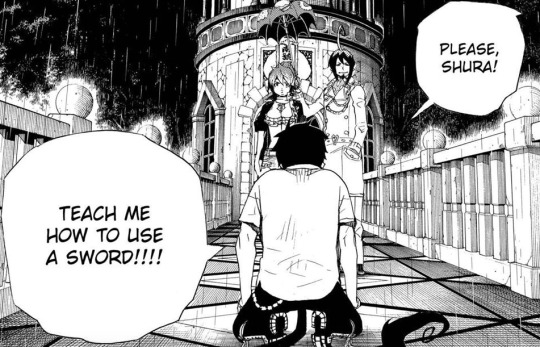
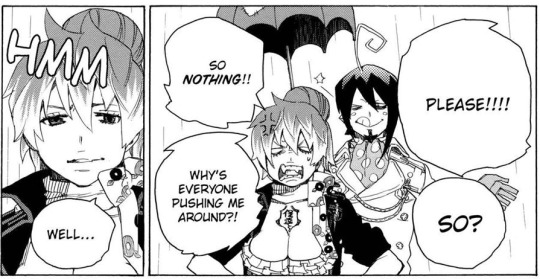
2) Rin's secret, despite being the MC, was revealed in ch13 to the entire cast, meanwhile Shiemi, The Main Girl, who was introduced to be so helpless is only starting to be explained.
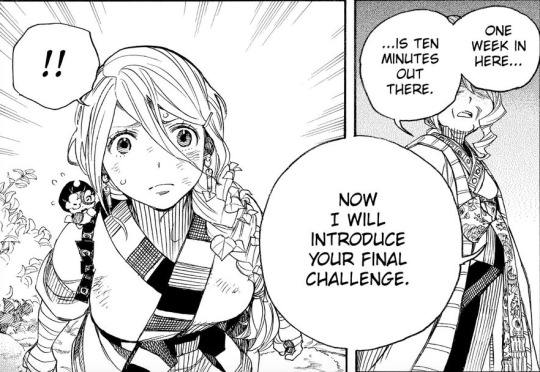
3) Also, the Mysterious plot-relevant Shonen Parent is actually the twins' mother. (Of course Shiro is super plot-relevant too, but Satan is still angsting over Yuri and she's a huge part of the reason why he's the big bad)


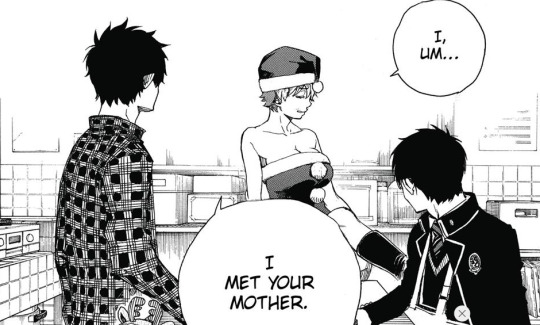
4) Rin also changed his view about his future throughout the story: from dropping out of school, passing by hoping to become the Order's Paladin (probably to cope with Shiro's death and also to antagonize Arthur), to finally showing way more interest and potential in the (less epic and heroic in appearance) field of talismanic cooking.
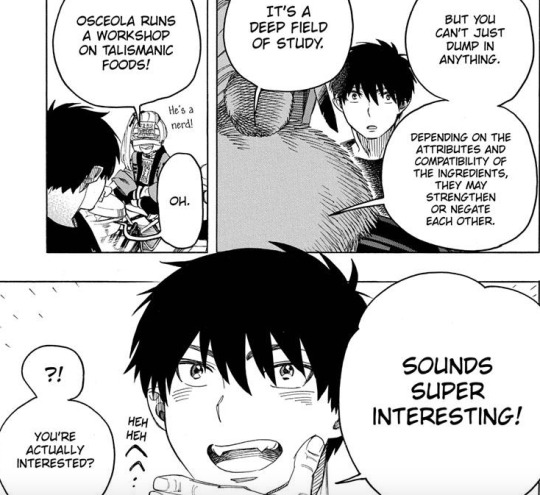
5) When it comes to arcs, mental illness is a valid reason to build a character arc around...
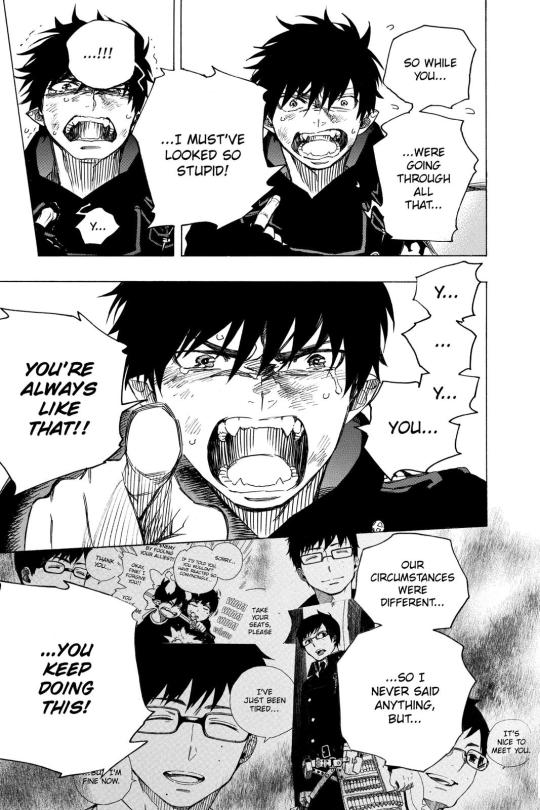
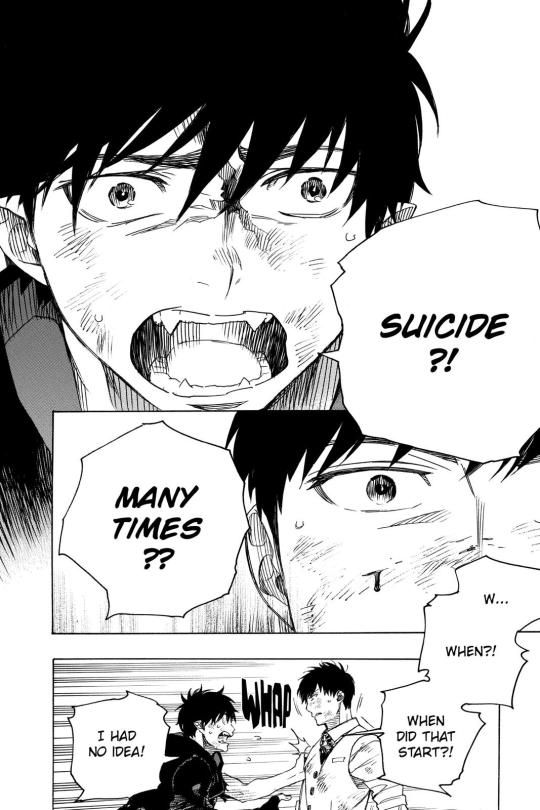
6) And so is making an arc about girls being "cursed" to basically "get married and have children before they hit 30, the age where their beauty fade thus they become useless" :
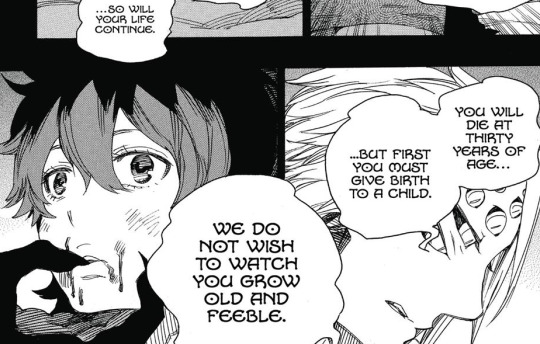

7) ANE is a story about women becoming traitors to protect their loved ones, like Mamushi
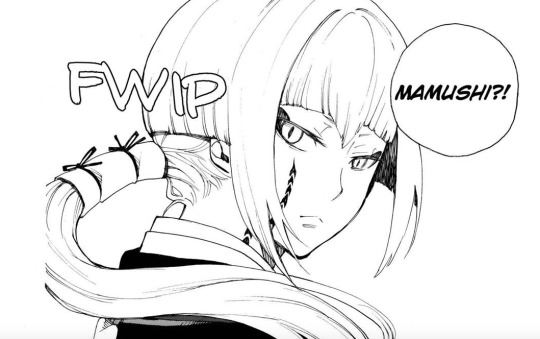
or becoming overwhelmed because men toyed with their feelings like Tamamo
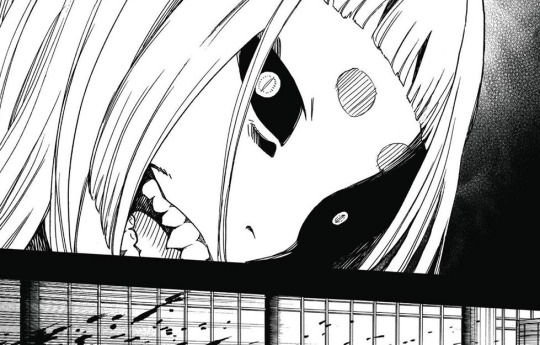
8) Older women can be absolute badasses like Shiemi's grandma

or Lucy.

9) Complicated mother-daughter relationship and girl friendships are given as much focus as complicated father-son relationships and sweet bro friendships (like Bon and his dad during the Kyoto arc, as well as the complicated but deep bond between the Kyoto Trio)
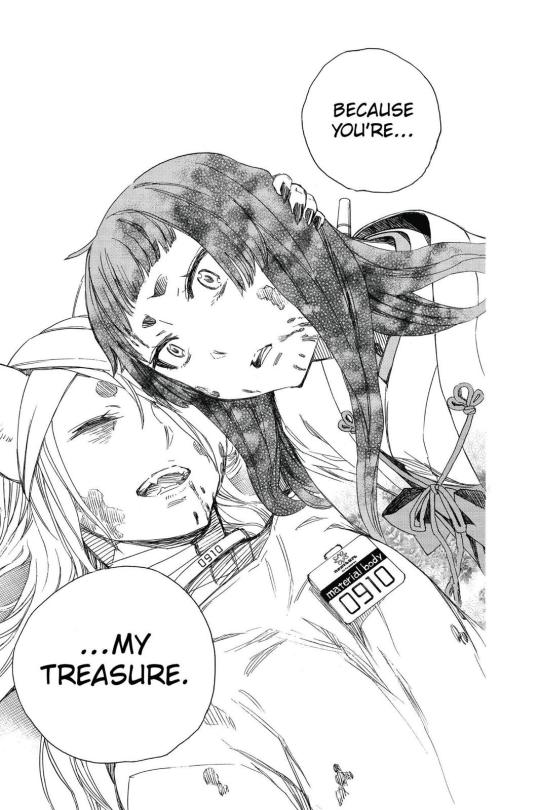

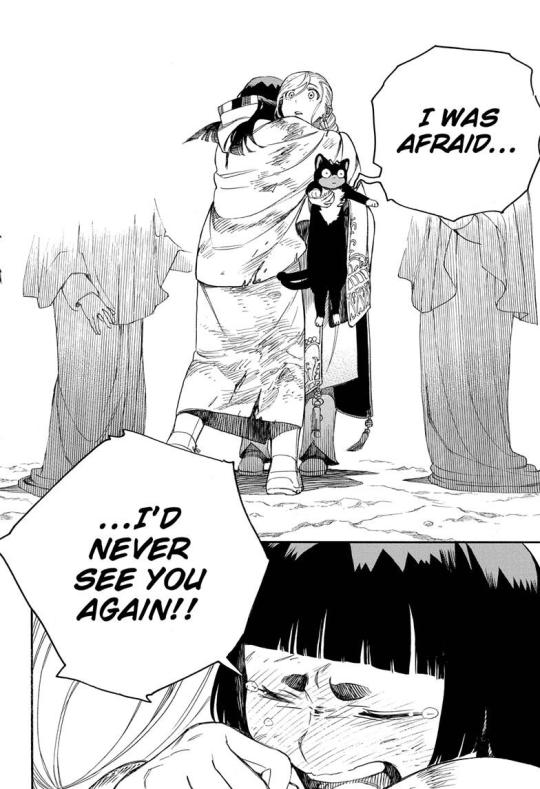
10) And one of my favorites: full time single dad, asking for help to do the job as well as he can and finding his true purpose in life by doing so :D
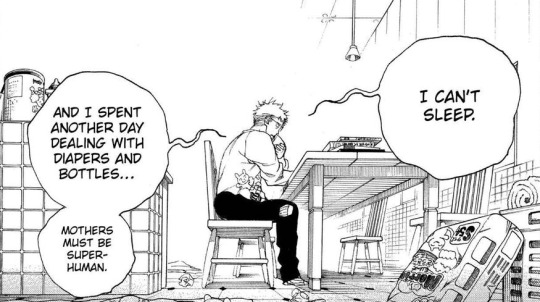
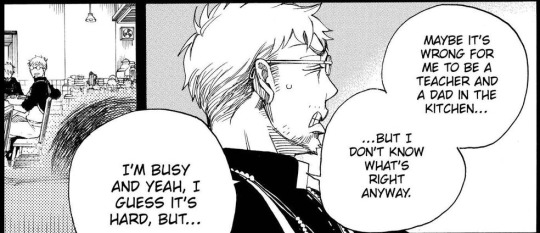
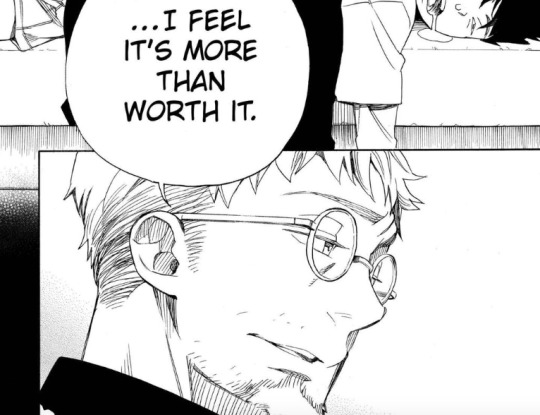
Hmm and now that I think about it, the only other Shonen series written by a woman I've been as invested in is Kuroshitsuji, by Yana Toboso, and similar examples can be found in it too, namely:
1) If Ciel ever finally admits needing a mentor, his aunt Frances will probably play that role
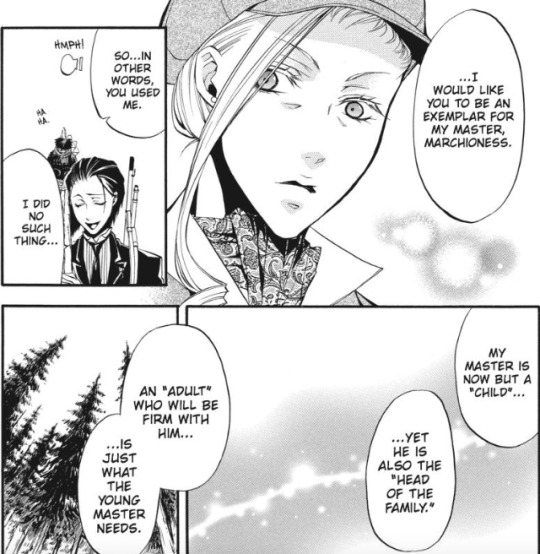
2) Girls can be super strong & skilled (Elizabeth, Mey Rin) and clever (Sieglinde)
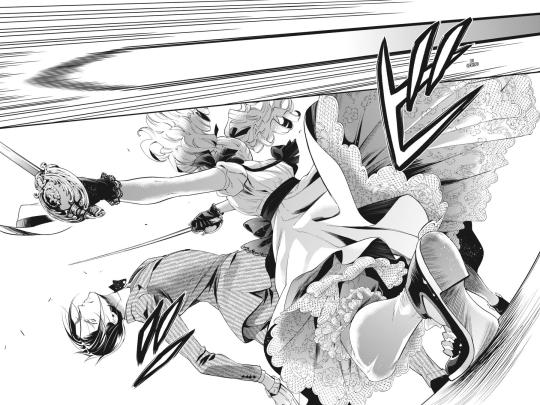

3) (one part of) the Big Bad is a woman (Queen Victoria)
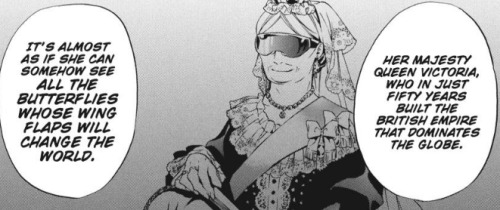
4) maybe Ciel's entire revenge stems from a conflict between Queen Victoria and Ciel's maternal grandmother, Claudia.
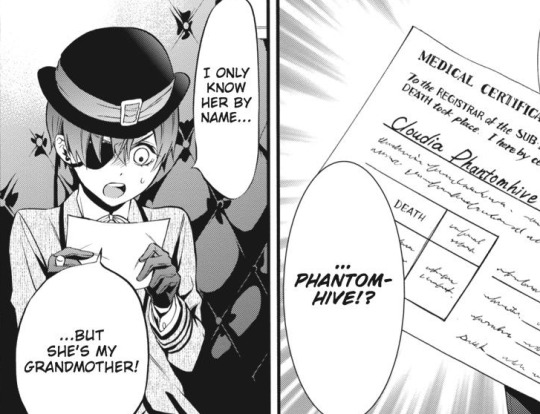
5) the Undertaker has been a continuously freaking pain in the ass because he probably fell in love with that same maternal grandmother and couldn't mourn properly

TL;DR we love our boys and their spectacular growth and development under women's pens a.k.a shonen series written by ladies are hella fun to read. :D
#ao no exorcist#okumura rin#okumura yukio#fujimoto shiro#yuri egin#kirigakure shura#moriyama shiemi#kamiki izumo#kato kazue#kuroshitsuji#yana toboso#claudia phantomhive#ciel phantomhive#queen victoria#frances midford#elizabeth midford#sieglinde sullivan#mey rin#undertaker#my analysis#why you should read or watch#narratively speaking on aspects such as plot intensity and worldbuilding in manga#the best series i've read is Berserk written by Miura who's a guy and One Piece is another extremely good title#but when it comes to depth i really enjoy Kato-sensei's writing as well as Yana's#it's quite an interesting contrast in what it brings to these stories and characters and i feel very lucky to be able to read all of them
998 notes
·
View notes
Note
Hi! I’ve seen people people say that Dimitri speaks in an informal rude manner in Japanese so him being super polite in English is weird changes his character a lot, but I’ve also seen people say the localization is just fine. Could you clear up please? Thank you!
This ask has been in my inbox forever, and I know other ENG/JP bilingual FE fans have weighed in on this topic before. But exploring the nuances of Japanese formal vs. casual speech is always super fun, so I want to share my own thoughts too. There's always a chance there will be more to learn with each new person's input on the same topic. Plus, I discovered some things even I didn't expect! So, I'll still offer everything I have to say!
First, I'll explain the full background this ask is referring to. Japanese has 2 major distinct speaking styles - casual and formal. I was taught to call the formal style "distal" - because it is more about respecting distance in social standing than being formal specifically. But formal is the more common term, so I tend to stick with saying formal most of the time.
The distinction between casual and formal is made with pronoun choice, word choice, and other factors as well, but the fastest way to differentiate the two is to look/ listen for the use of desu and masu at the end of someone's sentences. Formal uses them. Casual drops them. This concept is entirely foreign to English speakers!
Dimitri drops desu and masu most of the time. His "I pronoun" is also ore, and his "you pronoun" is omae - both casual, blunt, and masculine choices. But does speaking casually to most of the cast make him rude?
Short answer is... no, not at all! There's 2 major reasons for this.
Reason #1 - the rules for casual vs. formal speech are a bit different in reality vs. fiction:
Partially, Dimitri speaks casually because he is showing his personality. He's got all those traits most standard FE protagonists share - he's strong, straightforward, and wants to connect directly on a personal level with everyone he meets. He tries to convince several characters that they can speak casually with him, because he sees people as people, and doesn't want social status putting distance between them.
Fictional characters generally speak more in-line with their personality more often, rather than following the socially acceptable speaking rules of the real world. (Though don't get me wrong - casual real Japanese people will speak casually in more circumstances than the average Japanese person.) This is simply the style that Japanese writers largely choose. And I think it is one of the great benefits of Japanese - anyone can start to pick up on a character's personality archetype almost instantly, thanks to their speaking style!
Reason #2 - Dimitri is a prince, making him of high social rank:
Here's the second nuance to this - it is absolutely standard for a superior to talk to their subordinates in casual style.
In modern times, this is shown in the workplace. Bosses and those in other leadership positions will frequently speak casually with the staff in a lower-ranking position than them. The president of the office I now work at is Japanese, and he speaks very casually with me - I have to be formal in response though, because he's at the top!!
But in the past, this would have been a distinction made between lord/ royalty, and those beneath them. Which is the case that is relevant in Fire Emblem's setting.
Dimitri can also speak casually without coming off as rude, because he is one of the highest ranking people across all of Fodlan.
-
Okay, so that's the answer in broad strokes - but let's get a bit more nuanced, go down Dimitri's support partner list, and confirm whether or not he always speaks casually!
Group #1 - Dimitri and the other citizens of Faerghus (8 other Blue Lions + Gilbert)
Dimitri has a multi-layered relationship with all of the other 8 Blue Lions. They are citizens of the country he is a prince of, therefore he is ranked very highly in social standing above them. But they are also his friends, classmates, and later, war allies; placing them on the same social level in that regard. So the way they speak to him comes down to a little bit of column A - personality, and a little bit of column B - which aspect of their relationship with Dimitri they feel is the "main" one.
Gilbert is also here in this category, as another person from Faerghus.
Dedue: Dimitri speaks casually, Dedue speaks formally, as they have a lord/ servant relationship. Dimitri wants Dedue to be a very close friend to him though, and wants Dedue to speak casually with him - this is a major source of tension in their supports. In the end, being able to mutually speak casually with each other and be friends, is a place they may reach one day. With other characters, Dedue speaks casually.
Felix: As royalty above Felix's noble house, Dimitri speaks casually. Felix is Felix, so he speaks casually too. I imagine he sees Dimitri quite literally as more of a wild boar than a human being, much less royalty.
Ashe: Dimitri speaks casually, Ashe speaks formally. However, pretty much the whole point of their supports is Dimitri attempting to get Ashe to speak casually with him.. Ashe tries in earnest to switch, but in the end sticks with speaking formally, otherwise he feels too uncomfortable. His view of Dimitri as his prince is too strong for him to let go and speak casually.
Sylvain: Dimitri speaks casually, and Sylvain speaks casually more often, but actually switches to desu and masu more than once. When a relationship is "in-between" higher/lower social standing and friendship, it's not uncommon for at least one person to switch back and forth between casual and polite speech, depending on which side of the relationship they are appealing to more at the moment. This happens in real life too as people shift from strangers, coworkers, etc. to friends.
Mercedes: They both speak casually. In Mercedes' case, I think she's speaks more in-line with her personality rather than paying attention to social status.
Annette: Both speak casually, but Annette is well aware that there's something a little wrong with that - her father would never let her get away with it if he knew!
Ingrid: Dimitri speaks casually, Ingrid speaks formally. But I think Ingrid speaks formally with everyone.
Gilbert: As you can probably guess based on my comments in Dimitri and Annette's analysis, her father most certainly speaks formally with Dimitri! He is very formal and takes social heirarchy very seriously. Dimitri, as the prince above him in social status, speaks casually.
Group #2 - The other characters at the monastary:
Since the remaining characters are not from Faerghus, Dimitri is not their prince. They'll be more likely to view him through the lens of a different relationship than royalty/ subject.
Catherine is originally from Faerghus yes, but she has cut her ties from her homeland completely to serve Rhea, so she fits into this group now.
Raphael: Both speak casually. I think Raphael treats everyone like a life-long friend!! He at least attaches san or sensei (teacher) to the names of his instructors, but that's about it for formal language for him.
Marianne: Dimitri speaks casually. Marianne speaks formally, as she does with everyone. I think she even attaches san to everyone's name, conveying how much she keeps her distance from people, trying not to form close relationships.
Flayn: Dimitri speaks casually. Flayn speaks formally, as I think she does with everyone.
Hapi: Both speak casually. I think Hapi speaks casually with everyone.
Alois: Now *here's* where things get interesting! At this point, I really thought I would discover that Dimitri speaks casually with everyone. But alas, he does NOT! Dimitri speaks formally with Alois, while Alois speaks casually to him. Why? Well, while Dimitri is a prince, he's also a student at Garreg Mach (in Part 1 of course). In this way, he is below all Garreg Mach staff and professors in social standing. So it makes perfect sense that he'd speak formally and Alois would be casual in this case.
Catherine: Same situation as Dimitri and Alois - as someone who serves as an instructor at Garreg Mach, all students like Dimitri are below her in status at the monastary. So Dimitri speaks formally, and she speaks casually.
Byleth: I left Byleth for last, because while Byleth is a professor at the monastary... Dimitri speaks casually with them. I imagine this has more to do with Byleth being the self insert than anything. Everyone bonds to Byleth on a deep level faster than magnets stick together.
And that's all I can think of to say for now! This is a super fun example of how nuanced Japanese's casual vs. formal language can get, and showcases one of the many reasons why Japanese has such a high barrier of entry for anyone learning it - including young native speakers! You don't get all this desu and masu stuff, until finally you just do.
Let me know if I missed anything, or if anyone has any follow up comments to make!
I apologize it took me so long to respond to this one! Thank you anon, and all readers, for waiting! I hope it helped explain even more of the trickier nuances of Japanese.
#fire emblem#fe#fire emblem three houses#fe3h#fire emblem 3 houses#fe three houses#dimitri#dimitri alexandre blaiddyd#switch#nintendo switch#japan#japanese#translation#localization#fire emblem support conversations#support conversation#fe 16#fire emblem 16
166 notes
·
View notes
Text
Once again on why you’re all wrong about Veilguard, let’s talk about the red lyrium and the blight and why it’s shown as two different things in Veilguard and what it represents and why this isn’t a retcon or bad writing. Because I saw people genuinely confused about the red lyrium in Harding’s quest. I’m actually not trying to be a dick here I genuinely want to clarify this for people and not just because Harding is my wife and I’m obsessed with her quest line and what it means for dwarves. It also illustrates what I love about Veilguard. Spoilers under the cut. Also trigger warning for talk about processing trauma.
This is going to sound facetious but first things first, Origins established lyrium is blue and you shouldn’t touch it unless you’re a dwarf because it’s basically raw magic.
Then DA2 established that red lyrium is really bad. It’s like the One Ring as far as what it does to your brain Prolonged exposure will turn you into a monster.
In Inquisition we learn that red lyrium is blighted. The blight can only affect living creatures. This means lyrium is alive. We also know that red lyrium is very, very angry.
In Veilguard we learned the blight is actually a living entity all on its own, a combination of magic and existential horror and the living embodiment of the mind of hatred born from the pain of an entire sapient race being exploited. (Like holy shit I can’t emphasize enough how cool I think this is as a concept).
But what we are supposed to infer during Harding’s quest is that lyrium turns red when a Titan is in pain or angry. The reason the blighted lyrium is red as well is because it is literally infused with the Titan’s nightmares. We essentially learn not all red lyrium is blighted but all blighted lyrium is red. This is just expanding the concept and isn’t a retcon. This through line was being set up since at least DA2 if not origins.
Side tangent, I’ve mentioned I worked in the medical field and a pet peeve of mine is people saying blood is blue before it’s oxygenated which isn’t true your blood is always red. But I love how the Titan blood is blue but when it’s exposed to pain it turns red. Not really relevant I just think it’s neat.
Anyways, so when Harding touches the dagger I believe she opened a two-way connection to the Titan, which is why she gets her stone magic. But I believe she also received the pain and rage that the Titan was harboring for literal centuries. By opening that connection, the Titan turned Harding into its avatar in much the way Valta was.
Harding’s shade is red for the same reason the lyrium is, she was forced to cast out the hatred for the sake of her own survival. It’s literal pain and anger. She’s a reflection of toxic positivity as a character. She’s always cheerful for survival even when she has every right to her emotions. What Solas and Mythal did to her and her people, both personally and across the eons, is truly awful. This why Harding waffles on Solas before she embraces the shade, but why she fully lays into him during the final mission if she gets the chance. (If you haven’t heard that banter it’s so good. I’m so proud of her.)
It’s not until Harding embraces her negative emotions that she and the shade and the Titan can rest easy. However you make that choice, Harding has to acknowledge those emotions and cleave to them. Something a lot of trauma survivors struggle with. You have to face them and process them or your body will hang onto that hatred and pain until it kills you. Harding’s journey is at its heart, about uniting who you were with who you are so you can move forward. Healing means reckoning with all of the parts of you, the good and the bad.
#dragon age#veilguard#veilguard spoilers#lace harding#tw trauma#nothing good happens in the deep roads#except the healing power of love
102 notes
·
View notes
Text
Reverse 1999 and child soldiers (just rambling) (global friendly)
It doesn't take long for anyone to realise most of the cast (excluding awakened, entities like Voyager and AlienT, and people like Eternity) are young: ranging from most being 17-16 with adults around their 20s and Shamane currently being the oldest (excluding the above) at around 40. (Edit hes 45 thanks for clarifying)
Alright you say, this is a gacha game ofc the characters would be around these ranges and we hope every patch to get character that is above 40 (wdym someone like Tooth Fairy isn't 30? Same for Kakania and Isolde, how are they 19 and 18 respectively?For example). Hey I would like more older characters too, but I think the ages are partially intentional if we look into lore on a thematic level.
Ok. We already know the Foundation, Laplace and now Zeno (though it was ofc from Lilya) they produce child soldiers, workers and scientists:
Vertin is the Timekeeper at 12
Sonetto probably became a field investigator around 14-16 at best (correct me if we have a better frame of reference)
Ms Moission in her character profile apparently was a field investigator at 14. (I spelt her name wrong I think)
Mesmer Jr started working at the age of 12
As of the release of the Zeno anecdote we know Lilya around 14 was already in field missions and has seen the state of war.
(Probably could include X, Horrorpedia here but I don't have much info)
What am I getting at? Characters being young in their fields of work is completely intentional, one due to the Storm in the case of the Foundation as the first had taken nearly the entire workforce (plus Child Labour Laws) so in desperation to maintain numbers and order the age to become investigators, soldiers and scientists became much lower. I don't know if the SPDM existed before the Storm but the way it functions primarily serves to replenish those lost workforce.
And two: the perception of arcanists and the importance placed on the manifestation of their arcane skill as young as possible.
We see this in the case of Mesmer and Isolde/Trista.
Mesmer Jr once she was tested to see if she had her arcane skill immediately was set to manage mentally unstable patients at the age of 12. (She alongside Vertin probably needs the most therapy)
For Trista this was the seance her mother brought to at the age of 3, dying as a result and leading to her mother with Isolde to delay by 3 years. (Acting as if that was a mercy which it really is not)
There is an emphasis on an arcane families and arcanists maintaining their societal status/ relevance through children developing their arcane skills as soon as possible plus the idea of childhood and working is flipped on its head with the presence of arcanum.
Ok idk if worded that bit correctly but in short: our idea of when a child should be working (which is never) or the time someone should be in teaching before they get into a profession (TF, Kakania and Madam Z) is warped and absent in R1999. For Kakania, shes 19 but I would argue this is because of how she had dropped out and decided to be an unlicensed doctor. Most characters being younger is the result of arcanum being present in the world.
Moreover there is a general theme of lost childhoods/ forced to grow up fast in the younger cast. Exclude characters like Ezra, Matilda (so far) and Spathodea since they are relatively fine/ not deeply traumatised. Everyone else, Vertin, Sonetto, Mesmer Jr and characters like Eagle, Monlicht, Oliver Fog were forced to grow up fast despite their young age.
Summary: characters being in younger age ranges either being literal child soldiers or certain adults being relatively young is the result of the devastation of the Storm alongside the different perception of age in the arcanum world, there the manifestation of your arcane skill seems to be used as a sign of maturity and readiness to be thrown into work (Mesmer and Isolde being put om their respective career paths at a very early age) (or your Constantine celebrating the erasure of Child Labour Laws)
#reverse 1999#ramblings#r1999#vertin#analysis#vertin reverse 1999#isolde#idk to tag everyone here thats long lol#still i would like older characters than the i look 40 but actually 20 thing#idk if i explained properly here
164 notes
·
View notes
Note
You've done this before so this is exclusively self indulgent but can you give your thoughts on DRDT foil theory again haha... I'm enamored by it and think about it daily.
I'll point out as well that there's been a trend regarding which characters are relevant to the chapter's case based on the order of the foils so far.
In chapter 1 it was [Xander, Min, Teruo & Charles] while in chapter 2 it was [Eden, Arei, Nico, Ace] - following this train of logic next chapter's main players would be [Hu, Veronika, Rose, J].
Hu's arc has just started (her beliefs are being challenged), Veronika became worst + Arturo is going to be centered at the start of chapter 3, Rose's arc just started + a money motive would be relevant to her & J's conflict with Arturo is going to be centered at the start of chapter 3.
Feel free to ignore this if you feel it's too repetitive, I just like it when I see people talking about my theory lol.
Well, if the creator of the recap foil theory asks me to talk about it, who am I to deny? It's probably, like, in my top three theories about DRDT, so I'm gonna enjoy talking about it! :D
(Btw I totally get you about enjoying when people talk about your theory. Whenever I see someone mention one of my posts I always go ":O that's me :D" it's great lol)
CW: Murder, electrocution, execution, suicide, self-harm, eating disorders, discrimination against a non-binary person, manipulation, poverty, harmful environments during childhood.
As a quick recap (heh): at the end of the CH1 recap video, the characters are paired up in a certain way. The theory states that they're paired up in a way that represents some of the most important foils in the cast. And... well, it seems to hold up quite well! I'll talk about them here in the order they show up in the recap video.
1) Xander & Min
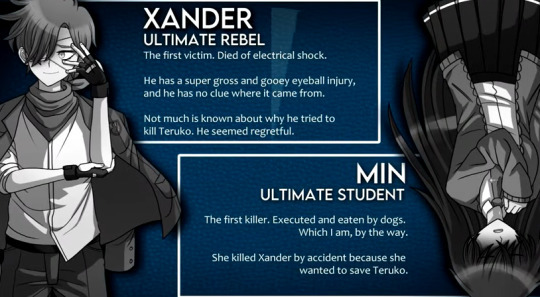
And what a start! These two are basically eternal foils, with everything about their characters being contrasted with each other in some way or another. From the very first moment they're seen together, in Min's introduction, they immediately start beefing simply due to their respective talents.
The biggest point of contrast comes from their past with education. From Visiting Graves, we know Xander used to be a diligent student like Min, but he stopped when his family died while he was away studying. He's come to the conclusion that the things taught in school are oftentimes kind of useless for most people's lives, and his rejection of the education system kickstarted his rebellion against systemic issues in general.
Min, for her part, actually has a lot of the same views. Her Bonus Episode makes that pretty clear; she doesn't think things like Hope's Peak's history are really all that useful, and feels insecure because she doesn't see the same value in her talent as she does in others. However, Min still wants to maintain her talent, at least in title, seen as her first instinct when the killing game started was to grab an anatomy textbook and start studying it. Meanwhile, Xander dislikes his talent title greatly, as he believes calling him a "Rebel" undermines the stuff he does.
All of this is literally baked into their first interaction, as mentioned before. Xander seems to project heavily on Min upon first meeting her, assuming that she probably has no hobbies or friends if she's the Ultimate Student and judging her for it quickly. Min isn't particularly thrilled over that, given he knows nothing about her life.
Speaking of backstories, there's other points in those where they contrast. Particularly, the involvement of large companies and rich people in said backstories. Duke Spurling did a thing that killed Xander's entire family, which was the inciting incident for Xander officially leaving behind his studious nature. Meanwhile, XF-Ture Tech helped Min's family out of property, but pushed Min into studiousness for the Ultimate Student title; more or less the opposite of what Spurling did for Xander.
The same can be said of their relationship with Hope's Peak, which is elaborated on in the Bonus Episodes. Xander went to Hope's Peak for some kind of ulterior motive-
Unnamed Classmate [BE2]: I think your ability to get back from adversity is really admirable. That determination of yours is admirable. If you set out to do something, then never give up on that, no matter what obstacles may stand in your way. Even if it's risky or against the rules, as long as it's for a good cause... I'll trust that you know to do the right thing. Xander: Yeah, of course. That's why I've come to Hope's Peak, isn't it?
-which we can somewhat confidently assume to be bad for the school given Xander's... Everything. For Min's side, just getting to Hope's Peak was Min's entire goal for the entirety of her childhood, playing right into the hands of the Ultimate Contest for Eminent Students, and thus into the school's hands.
By the way, if you go back and look at what Absolutely-Not-Mai says to Xander, the idea of "bouncing back from adversity" could be connected to Min's whole "mistakes are to be corrected" thing. This one's an insane stretch, though.
For another point, though I don't know much about this particular topic, I find even their designs are opposites in some ways. Although arguably that's more a result of them being foils in general and DRDT having good character design but y'know.
Both of them seem to wear some kind of school uniform, but in totally different ways. Xander does everything he can to stylize his, be it wearing his coat as a cape, or getting a tongue piercing specifically because they weren't allowed and he could hide it, as stated in a Q&A, doing everything he can to fight against this institution. On the other hand, Min wears hers normally, and several Q&A answers clarify that she finds comfort in the colors and style of her uniform. One fights against institutions, the other works withing their systems (Min even wants to be a teacher which is an extension of that idea), you get the point.
Also this plays into the theme of fate because of course it does. Just replace "institutions" with "fate" and you kinda get the point. Xander fights against it, Min accepts it. Or, she accepts the fate of being the Ultimate Student, at least.
Their relationships with other characters, Teruko and David in particular, is another point of foiling. I've brought this up before, but as a recap: Xander betrayed Teruko so she openly hates him even though her real feelings are much more complicated than that, while Min tried to save her only to then panic and try to win the class trial, which causes Teruko to openly hate her even though her real feelings are much more complicated than that. But Teruko takes on Min's philosophy of fixing mistakes in the second trial, which is notable because in the same trial, David calls Min pathetic before his magical girl transformation, only to reveal that he's following Xander's ideals a while later. And while Teruko and David may not be recap foils, they sure are foils in general, so the foiling Xanvid and Terumin duos are formed. Cool!
As a minor point also connected to relationships, I could see the angle that Xander's friendship with David might parallel Min's thoughts on Mai. This one's iffier because anything about Mai is iffy, but I think it's worth mentioning.
The starting point of the Xanvid thing is the fact that they both used to idolize each other, but eventually decide that they should just be friends like any other friends. Cue the whole "foxes and children" quote from The Little Prince that shows up in LGI in the "I hate the things I love..." scene- I don't know how many people can follow what I just said, but I hope the main idea got across, at least.
Xander [1-5]: Enough with these idols or role models, okay? Let's just be friends.
In the same way, everyone loves Mai, but Min's Mai quote is:
Min: An average girl with nothing special at all about her.
Which can kinda be said about Min too, but the whole point of the end of the Bonus Episode is how Min is special to Mai.
Think of David as Mai and Xander as Min. David and Mai are idolized by everyone who knows them (pre 2-11 anyways), but Xander and Min see them as regular people (post 1-5 for Xander), while Xander and Min aren't idolized (by most of the cast at least) but are special to David and Mai respectively. I don't really know if it works perfectly, but it's close enough for me to mention.
You can even try to fit in some kind of point about the theme of cooperation vs competition, though I'll admit it's a bit of a stretch.
Competition is greatly important for Min's character, but she doesn't often go out of her way to help others. She helps when asked, sure, as she does when Surely-Not-Mai asks her to help her study in BE1, or when Eden asks for help baking and the subsequent clean-up. However, there's several scenes where she avoids conflict by reading that anatomy textbook of hers, such as in her introduction and when Arei's yelling at the Baking Squad.
Meanwhile, Xander doesn't really compete on anything with anyone aside the arm wrestling contest (which isn't much of a competition anyways), but he constantly tries to butt into other people's issues. It happens in Min's introduction, in his chat with Nico in 1-5, right before stabbing Teruko, you get the idea. So, he constantly tries to cooperate even without the consent of the person they're trying to cooperate with. Again, a stretch, but kinda works.
All of these foils culminate in Xander's death and Min's murder. Xander, like always, is proactive and acts even with incomplete information:
Xander [1-5]: Then, why did I do this? I don't even know... Why? Just why did you ask me to kill Teruko?
Trying his best to cooperate with an unknown ally to, presumably, hinder the mastermind's plans; fighting against the killing game like he fights against any other system.
But then Min barges in. She was just trying to fix the mistakes of the past, aka cleaning up the remnants of the baking thing. But just like her being randomly sponsored by XF-Ture Tech was in some ways both a blessing and a curse, she once again finds herself in a situation where, depending on how you look at it, she's either in the right place at the right time (to save Teruko) or at the wrong place at the wrong time (because she'll end up dying from this).
Xander attacks, and there's a bit of brain vs brawn thing that happens. I hadn't mentioned that theme before because Xander is intelligent and Min is arguably not the smartest in the cast, but it's true that Xander's physical prowess and Min's intelligence are some of their most notable strengths. This is brought to the forefront when Xander tries to kill Min by overpowering her only for her to outsmart him with the light switch trick.
However, again similarly to how she was pushed into a corner by the XF-Ture Tech contract, Min now finds herself in a position where she must compete with others for her own survival. And not just any form of competition, but a class trial. Once again, Min has to compete under the rules established by an institution, as she did in the UCES. She ultimately gets executed, but kept trying to survive until the very end, fighting for her life the same way she'd been fighting for her future her entire childhood; by trying to give the right answers in a test.
Look, there's probably more foils (because each time I look at these two I find more of them), but I need to stop at some point. These are characters who foil even in their fucking custom weapons for God's sake. Xander's "gun" looks extremely dangerous, when in reality it's nothing but a piece of plastic; and Min's pen looks totally safe, while actually hiding a knife. If I keep looking, I'll keep finding, and I have to talk about 7 other foiling pairs, so I'll keep it at that for this post :v
2) Teruko & Charles
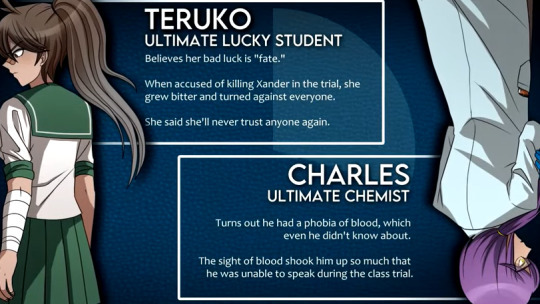
There's plenty to talk about with these two as well! The main point of foiling is their respective character arcs so far.
Charles started out as a prickly and judgemental guy, pushing the others away as he felt superior due to his talent. However, after the events of the first trial, he started opening up a bit more, and hanging out with the others, mainly Whit.
Teruko, for her part, started out friendlier. She made a quick connection with Xander, and we saw her socializing with the elevator scene with Ace and Levi, and the baking squad scene. However, she went the other way after the first trial, pushing the others away to avoid getting attached and trusting no one. She's swinging back to trusting now, but the point stands.
Basically, Teruko and Charles went in opposite character arcs in the first two chapters. In that sense, Charles exists as an early warning to Teruko about the dangers of pushing others away, as the only reason Charles managed to get through the first trial is because Whit trusted him and his hemophobia. So, trust, relying on others, important themes their stories share.
And it's not just the in-killing game arcs, as their backstories also vaguely foil. Charles had a pretty privileged upbringing, while Teruko obviously had a lot more issues with her luck and all. Funnily enough, this includes them having scars they don't properly remember getting. Charles believes the dog bite wound on his arm is a birthmark, while Teruko doesn't know where the scar on her back came from.
Which is what gets us to the theme of memory we got going on. Both of them have memory issues, albeit different ones: Charles has childhood amnesia, Teruko has prosopagnosia. They even both have a brother of indeterminate fate, what with us not really knowing what happened to either "Kyo" or Elliot. Well we know Elliot's dead at least but you get the idea.
Speaking of the Elliot situation, one can tie this pair to a theme I can best define as "challenged preconceptions." Basically the idea that there's preconceptions these two carried into the killing game which are challenged by the events within it. That can technically be said about a lot of characters, sure, but Charles and Teruko have a fair amount of very specific notions which are only begin doubting in the killing game.
For Charles, this would be the existence of Elliot; that's the point I was trying to make with that segue back there. Charles thought he was an only child, but turns out he had a brother at some point.
Charles [2-7]: From birth all the way to the present, there are probably many things that you had taken for granted to be true. Things you never thought to question before, like those frivolous lies about "Santa Claus" or the "Tooth Fairy." Or perhaps less frivolous lies, like the idea that your parents know what's best for you. Once you're given some hitherto unknown information, you may begin piecing together a bigger picture of your past. Things you had accepted as truth your whole life begin to reveal themselves as lies. And once all the pieces are in place, you realize you were blind for never seeing the whole story before.
It's what Charles' numeral in LGI references: "if you doubt, brittle things are broken."
For Teruko, there's a few preconceptions that get challenged over the course of the killing game, but probably the most notable one is the idea that she's doomed to live a horrible life due to her luck.
Teruko [2-16]: I have always said that my misfortune, my personality, the choices I make, everything was all a product of a bad luck that I can't control. That I grew up in such horrible circumstances, so I was destined to grow up to be a terrible person. That everyone else abandoned me, so it's not my fault that I'm alone. I want to say that it's fate's fault, and that I had no choice in the matter. But, even so... Even so... Everyone. Xander, Min, Arei, Ace. Maybe even Levi. Is it my fault that they died? [...] Whether it was the fault of fate, or my fault... I already knew the answer. I had known what the answer was since a long, long time ago.
I think you can kinda see the point.
Their aptitude in class trials can also be mentioned. Although Charles was sorta out of it during the first one, he was definitely pretty good in the second one. And Teruko is far and away the most influential character in trial discussion overall. The fact they're equally matched intellectually speaking helps them play off each other pretty nicely.
Like with Xander and Min, there's probably more to talk about, but that's enough for me in this case.
3) Eden & Arei
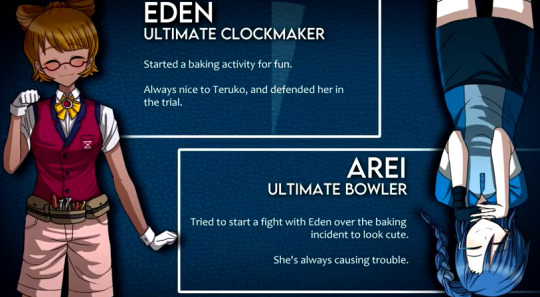
The girlies! Arei's playground breakdown very neatly captures a lot of the themes these two foil on. Mainly, the theme of kindness and being a "good person." Arei used to try and be kind, but she was hurt because of it and thus decided to fight back against her sisters through becoming mean. Eden, meanwhile, remains kind and compassionate even through the despair of the killing game. This also plays into the idea of strength; while Arei is physically stronger and more forceful when it comes to getting what she wants, Eden is stronger in her resilience, her ability to remain Silly despite the horrors. Both have their merits, as we see for example when Arei defends Eden from Arturo and when Eden manages to move Teruko in the 2-3 kitchen scene, respectively.
Meanwhile, when we speak of being a "good person", Arei's breakdown of what that means in 2-13 is really all we need to talk about. Eden's seemingly unending patience and kindness is not what's truly needed to be a "good person", as even she must have made mistakes and hurt people in the past (cue fork CG). Rather, being a "good person" just means trying to change for the better whenever you mess up, represented by Arei. Not to say Eden's not a good person; she is, but you don't need to be like her to be "good"- you get the point.
In the same ballpark, we have the theme of friendship, what it means to be friends. In fact, Arei's little 2-10 reconciliation speech connects both this theme and the last.
Arei [2-10]: Being a good person means doing nice things. So if there's anything you need from me... Whether it's defending you from scary jerks like Arturo or baking some stupid fucking cake... I'll do it. I promise. I'll do anything for you. Okay? Eden: I... Arei: Because... because... Because that's what friends do.
Arei believes friendship to be all about doing things for the other person, protecting each other. This is pretty central to her character, seeing as "Because that's what friends do" is her secret quote. Eden brings up the same thing when acused of murder.
Eden [2-14]: I just wanted to help Arei.... I didn't kill her... Teruko: You know I can't just take your words at face value, Eden. Eden: Please, Teruko... You're my friend, aren't you? Friends help each other.... So please, help me...
So. That.
One could also connect Eden's theming around new beginnings (birthday right before New Year's, favorite color is daffodil yellow and daffodils represent new beginnings, her name references the Garden of Eden which comes from a story about the beginning of the world) to Arei's redemption arc, as Arei gets a "new beginning" in the kindness she once showed. This even ties into Arei's death thematically, as Arei not only dies trying to be a good friend to Eden (tying into the theme of friendship), but she specifically dies in the playground, a place connected to childhood. So we once again get "new beginnings" by connecting her place of death to her origin point and the time when she was kind, if you get the idea.
Again, probably more here, and for this one in particular I'm not even sure I really scratched the surface, but I'll call this good enough for now.
4) Nico & Ace
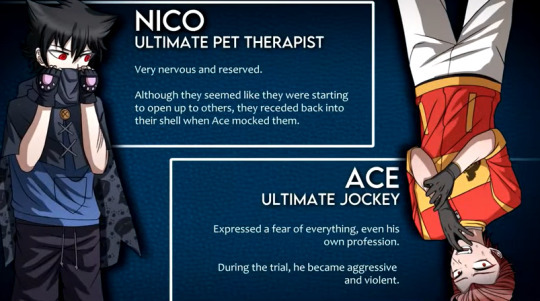
So these two have a ridiculous amount of beef and that's not really new. Even their very talents have foils; both work with animals, but Nico loves all animals, while Ace hates them, especially horses.
Ace [1-5]: Animals are fucking lame, anyways. Seriously, they suck hard. If someone told me their cat was acting up or something, I’d give it a good punt.
But the main point of contrast is the theme of agency and taking control of their situation.
Ace’s thoughts on this are expressed quite clearly in his secret quote, “I don’t know what to do with myself anymore.” He feels he lacks control over his talent (forced into it despite being deathly afraid of horses), over his feelings (obvious), over his relationships with the cast, etc. And so he tries to feel in control by bullying Nico, especially when he gets their secret so he can try to blackmail them. Not that Ace doesn’t bother Nico before that, but it does get worse in CH2. He repeatedly does self-destructive things just so he can feel in control of something, be it killing Arei because he feels everyone hates him and he has no way of fixing that before he dies, or trying to find reasons to get mad at Levi so he can try to control his feelings towards him when they become inconvenient for the whole murder thing.
Nico, for their side, keeps having their agency undermined by people around them. They get pushed by both David and Ace into revealing their secret before they were ready, Hu keeps defending them even after they ask her not to, they keep getting spoken over during the trial, etc. You can even extend that to stuff like feeling like they have to present as a man at the start of the series because the people from their backstory don’t respect their identity, or more minor events in the killing game like Ace reproaching them for just… wandering around.
Nico [1-8]: The motive was on my mind. So I was nervous. I tend to pace around when I’m nervous. That’s not a problem, right? Ace: Seriously? You were ‘wandering around’ all alone? You’re definitely the killer!
Basically, Nico struggles to assert themselves a lot of the time, which means they end up going from 0 to 100 pretty fast on the whole “murder Ace” plan.
That’s how we get to the theme of victims/perpetrators, or rather, how sometimes things are more complicated than that dichotomy. The theme is explored throughout their relationship, with Nico originally being a victim of Ace's bullying, then Ace being a victim of Nico's attempted murder, then Ace being a perpetrator of actual murder, you get the idea. Pretty straightforward there.
Going further, this also connects to the theme of forgiveness and apologizing, which comes up a few times in the trial. Nico doesn’t apologize to Ace after explaining their plan because they still hate him and know Ace isn’t going to forgive them, so they see no point in doing it. This parallels how Ace doesn’t expect anyone to forgive him for killing Arei, though with Nico, the question of forgiveness is currently open-ended, as there’s several characters who either have shown a willingness to ignore their crimes (Hu) or don’t know what to think of them (Rose). Basically, Nico has a chance to move past their mistake, which Ace isn’t getting.
And as usual, Ace’s death is the culmination of the themes his character embodies. He kills Arei, who is connected to him via the theme of bullying. He does it out of fear of death, because he feels he doesn't have enough control over his life to avoid getting killed by the enemies he made by insulting them all. Arei was on the path of forgiveness with Eden, which Ace cut short. Ace replicates what Nico did to him because Ace’s murder is the conclusion to everything that’s happened to him in the killing game, with everyone hating him and all that. You get the point. Hopefully.
For a relatively smaller theme, we can bring up dissatisfaction with their body. Nico is non-binary, meaning they’re presumably not very happy with the sex they were born with. Meanwhile, Ace has an eating disorder, not to mention that he always wears gloves for some reason (hiding his hands), and he wears heels to be taller because he’s shorter than he’d like, even though he’s also tall for a jockey. Can’t win, this guy.
Again, probably more to talk about, but I’d like to get this post out at some point this year :v
5) Hu & Veronika
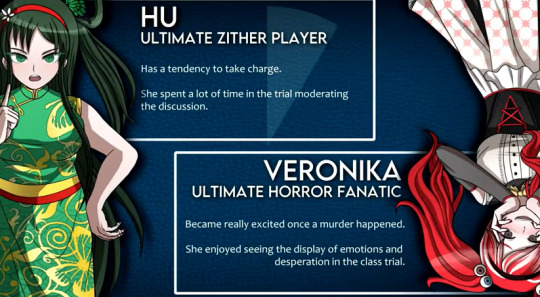
You mention in this ask that, since the first two recap foil pairs were important for CH1 and the third and fourth were important for CH2, it's possible that Hu-Vero and Rose-J could be important for CH3. That's certainly an interesting observation! We could also extend that to CH4, I guess, but that's a bit too far for me to talk about... so I won't! I will talk about CH3, though.
I'll get to Rose-J in their section, but I could definitely believe that Hu-Vero could be important for CH3. There's a fair bit of setup for both of them going through some kind of arc in the chapter, which you kinda mentioned in the ask (Hu has to deal with the fallout of the Nico situation, while Vero's reactions to Levi's near death and Ace's execution imply she's getting worse), and there's already a narrative connection between them through their pact about the secrets in the second trial. Not to mention that Vero's always given people CH3 death vibes, which I get even if I'm hesitant to say that myself.
But that's just speculation. What about the foils we already have? Well, the main point of contrast is their reaction to conflict, especially when it comes to a specific person they're particularly interested in. Hu always tries to mediate conflict and defend the people she considers good, mostly seen in her white knighting of Nico all throughout CH2. Veronika's the opposite. She enjoys watching conflict, stirring the pot with her psychoanalysis, and particularly enjoys whenever Arturo does some bullshit. Basically, Hu goes "I can fix them" while Vero goes "I can make him worse." Classic dichotomy there.
Then there's the matter of change, metamorphosis even. Hu’s character is designed around it, with her butterfly hairpin and the fact her name means “still lake”, as water is often connected to rebirth. And we know she has changed, from the hopeless child who attempted suicide three times into someone who seems quite attached to her life, if her secret quote is anything to go by.
Hu [Profile Source Code]: I want to pay for what I’ve done. But even then, I still want to live.
Much in the same way, we know Veronika in present is not the same person she used to be years ago. She mentions having been quite outdoors-y back in the day, some of that bleeding into her excitement about the playground, and of course her motive secret is that she used to self-harm, but no longer does.
And yes, the theme of self-harm/suicide is another one where these two foil, which has even come up with their motive secret pact in CH2. We don’t have many details on that yet, though.
That said, the reasons for why they harmed themselves seem to be quite different, which is noteworthy. Although we don’t know what exactly led Hu to attempt suicide, we do know that nowadays she desperately wants to be relied on so she feels useful, meaning it’s very likely her suicidal tendencies came from a feeling that her life had no meaning, or something equally depressing. Meanwhile, provided her secret is to be believed, Veronika just hurt herself when she was bored. Definitely very different reasons for self-harm there.
Looking over your original post on this (have I mentioned I’ve been cross-checking my own thoughts with your own? ‘Cuz I’m doing that), you also bring up maturity, which is indeed an aspect in which they foil. Hu’s character profile states she acts motherly, and the highlighted word in her subtitle quote (“Can you please try and act with a little more maturity?”) is, in fact, maturity. Meanwhile, Vero has childish tendencies, most evidently seen in the scene where the playground gets introduced.
There’s definitely a lot of things about these characters which we currently don’t know about, so I’m sure this section could get significantly larger in the future. But for now, this feels decent enough for me.
6) Rose & J
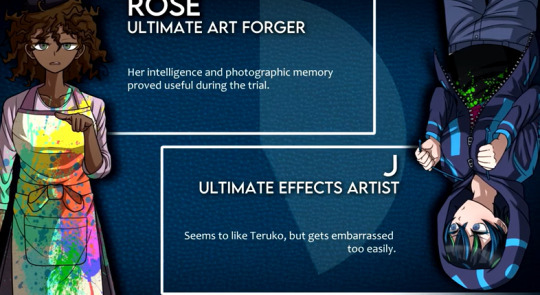
According to the extension of the original theory stated in this ask, J-Rose might be an important pair for CH3. And I can definitely see that! Rose's mental state has deteriorated a lot, so CH3 is primed to be a turning point for her character. Your point about Arturo being important at the start due to Levi's condition, and that possibly leading to attention being drawn to J, is also very reasonable. Not to mention that, as you seem to be aware of given what you said in the ask, DRDT's motives have so far aligned pretty well with the THH motives, with the first one being videos of their family and the second being secrets. This is important because, if that pattern continues, the third motive might be related to money. And one of the themes in which these two foil is wealth and poverty, which we'll get to in a moment, so it's entirely possible this pair could be quite relevant as a result of that. Not a bad idea in the slightest.
In any case, this is another set that mainly foils through backstory, at least for now. Rose was born into poverty, J was born into wealth. Rose tried to do everything she could for her family, J tries to distance herself from her mother as much as she can. Some parallels can be drawn between the influence the Spurling Foundation has on Rose’s life and the things Mariabella tries to force J to do. I can’t recall if this actually got mentioned in the series itself yet, but based on the childhood drawings post, we can tell J was probably forced to wear dresses despite disliking “girly” things per her profile, and from there infer that she was likely forced into doing a lot of things she didn't want to do.
These backstories can additionally connect to the ever prevalent theme of fate. Rose has accepted her fate, in a sense, believing that she’ll never escape her contract with the Spurling Foundation (see: her secret quote, “In the end, the only thing I can do is watch my wretched life go on”). On the other hand, J constantly rejects her fate by going against her birthright and hiding that she’s a Rosales (see: her secret quote, “Please don’t call me your daughter ever again”).
This is literally baked into their designs btw. Rose’s apron is stained all over, as if to signal she’s stained by the mistakes of her past, while J wears a hoodie as if to hide her identity as much as possible. Notably, J’s shirt actually has a paint splatter design, so she literally is hiding the stains (which in her case would be her last name) that Rose doesn’t bother covering up.
(Btw while I was looking at their designs for this I noticed J’s hoodie has two zippers, which threw me off a lot lmao. Apparently those are a real thing, but it still caught me off guard and I wanted to mention it lol)
On the topic of design, why do they wear the same shoes?


(Rose's on the left, J's on the right)
Like, Rose’s are a bit less saturated and maybe a bit more green than blue, but that’s the only difference I can see. I don’t think there’s any other pair of pairs of shoes that look this similar in the cast. Whit and Arei’s are similar to these, but they have a few different details. I don’t even think this is a foil thing I think Rose and J just have very similar taste in shoes. I find this amusing.
Anyways. Their talents are artistic.
…Yep, that’s the parallel! Admittedly, it does come up a bit, with J saying the decor looks new during the prologue, and Rose saying she could figure out a few things about the building if she could analyze the paint on the wall. They be detective-ing and stuff.
Arguably, the theme of betrayal can also be brought up, though it’s very minor. Rose got betrayed by Nico, who used her turpentine for their attempt on Ace. And something like that kinda happened to J around the same time, as she dragged Teruko into a dressing room to avoid Arturo and got a knife to her throat for the troubles. It barely counts, but given Teruko is one of the only people J seemed to genuinely like before that point, I’d say the situations are similar enough to mention, if nothing else.
Leaving it off there!
7) Arturo & Levi
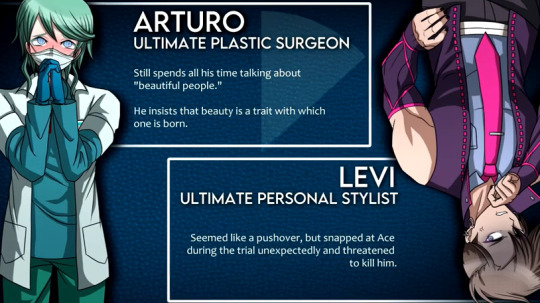
Let’s get the obvious one out of the way. Their talents are aesthetic related, be it related to people’s physical appearance or the clothes they wear. These talents connect to some of the other themes of their characters, such as Arturo’s obsession with beauty and Levi “styling himself” as a good person by doing things good people do, if that makes sense.
Then there’s the other big one; their family situation. Arturo’s home life was likely pretty bad, which we can infer from how desperate he seemed to get the hell outta dodge; and his sister committed suicide because Arturo left. Levi also left his family behind, although in his case he says everyone was a “bad influence” on everyone. Plus, he directly killed his father for one reason or another. We did get to see how Arturo felt about Levi’s nonchalance about the death of his father in the second trial, and that furthers their foiling.
Arturo [2-13]: How could you simply *forget* that you murdered your own family member?
Yeah that.
Going back to the talents, there’s some contrast between how they got them. Arturo studied from a very young age and for years to become a Plastic Surgeon just as he entered adulthood, while Levi admits to being relatively new to fashion. They both kinda use their talents to escape their past in some way (it was part of Arturo’s plan to get the hell away from his home and Hope’s Peak is the reason Levi was never convicted for his murders), just that one had a little more planning behind it.
Then there’s the matter of protection. Arturo repeatedly resents the idea that because he has some medical training, he has to be the cast’s doctor every time someone gets injured, and panics when he’s asked to do something as serious as saving Levi’s life.
Arturo [2-16]: I–! I’m not that kind of surgeon! I’ve told you, over and over, I have no experience with saving lives!
Levi, conversely, actively wishes to protect the others, seen for example when he attacked MonoTV in the Prologue and when he jumped in front of Teruko right before she got shot at. It’s even clarified in the subtitle quote of his profile (“I will do my utmost best to make sure that you all are safe”). Levi likes to protect others so they see him as a “good person”, which segues nicely into a more vague theme of categorizing important people in some way. Levi wishes to be seen as a good person and thus is quite interested in those he considers good (eg Eden), while Arturo is only interested in talking to beautiful people. It’s very vague and I don’t have much to say about it, especially since we don’t know exactly where Arturo’s obsession with beauty comes from, but it’s there.
Speaking of that, another point of comparison is the way both of them seek the approval of one specific person in the cast. For Arturo, it’s J because of her mother. For Levi, it’s Ace because of what happened in the first trial. They do it in quite different ways, but it is a thing that happens, and the differences help highlight the main narrative points these plot points bring to the table.
I’m calling that good enough!
8) Whit & David
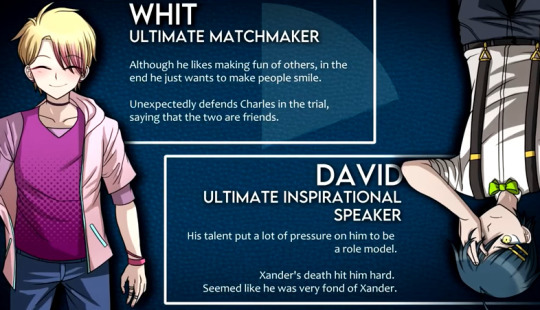
We sure left a pretty interesting one for last. This is probably one of the ones I’m the least clear on, mostly because both Whit and David are sorta unclear characters. However, there are still a few interesting things I can bring up.
Let’s start with the theme of idolization of the dead, because it’s quite literally what Whit’s secret quote references.
Whit [Profile Source Code]: We tend to idolize the dead.
Whit idolizes his mother, and thus tries to be like her in any way he can. He dyes his hair blond, he completely ignores the fact she’s dead, you know the drill. Meanwhile, David idolizes Xander. Take a pick from any of his 2-12 lines or any of the Xander related LGI bullshit to see what I mean by that.
Though, speaking of family members, Diana Chiem. Given we have no idea what the deal with her is yet, I won’t speak too much on it. But if you’ve watched my Vivisection of the David MV, you might know that there’s a theory brought up there that Diana may have died during Hope’s Peak time and that David’s started saying she never existed when that happened. The link sends you to that section of the video. It’s kinda insane, but there’s some basis for it, and it would create a pretty clear connection between Diana and Elizabeth (Whit’s mom) so I’m bringing it up.
Then there’s the theme of hiding/avoiding sad topics and the like. David is obviously not as happy with his life as he presents himself as, at least for most of the story, while Whit has a history of horrendously avoidant behavior when it comes to anything that’s even remotely negative.
David does occasionally talk about heavier topics, but always behind some kind of persona. Either as the inspirational speaker who takes on a leadership role in CH2 (see: revealing his family history of depression (which I think is true, even if he probably never thought that was actually his secret), comforting Arei in the playground) or as the cartoonishly evil person he pretends to be immediately after his magical girl transformation (see: “Arei was a weather spell” line). He’s seemingly a bit more candid when it comes to Xander in 2-12 for a bit, but then he mostly reverts back to just being an asshole most of the time, other than a few outbursts of genuine emotion (funnily enough, one of them being David shouting at Whit to take things seriously). Meanwhile, Whit (in my opinion) doesn’t seem to have a persona, per say; he’s just kind of an unserious person who repeatedly uses humor and other tactics to distract from the Horrors. He’s a deeply strange person, but that’s kinda just who he is.
Then there’s- say it with me everyone- the theme of fate. David believes people can’t change, that they’re fated to remain the same no matter what happens during their life. He’s made that stance relatively clear. Whit, for his part, has a much more optimistic view on humanity and the like, as he tells Teruko.
Whit [2-3]: Charles… No, everyone here… we might act callously, but we’re all only human. We're all real people with our strengths and weaknesses. You included, Teruko. Just like Charles, even if you’re acting cold, there’s still a part of you that’s good–
(And yes, “we’re all only human” can be contrasted with the whole “David doesn’t really feel human” thing from LGI and Tally 5)
Thus, his connection to fate is actually something that hasn’t been talked about in the main series yet, but rather comes from his character profile. All it takes is noticing the repeated references to luck and thing that are “guaranteed” (aka fated) to happen, and you can kinda piece it together from there.
Whit [Profile]: It’s said that if you get the Ultimate Matchmaker to find you a romantic partner, you’re guaranteed to have a happy and stable relationship for life. Unfortunately for Whit Young, he seems to lack all luck when it comes to finding a relationship himself.
And since that profile talks about his talent, I'll use it as a segue to look at similarities between Matchmaker and Inspirational Speaker. Both are talents based around influencing and advising people on how to achieve happiness, either in their love life or their… life life. Thus, both require some level of understanding on how people think and act, which manifests in Whit’s self-proclaimed intuitive nature and David’s confidence in his beliefs when it comes to people not changing and all that.
And… yeah I’m gonna say I’m okay with that for now.
-
Wow, that was quite a bit, now wasn’t it! And it still feels like I could find more if I thought about it long enough, but I hope this was enough for you. Thanks for the ask! The DRDT cast is really fun to talk about, though, so the excuse to do so is always welcome :D
#drdt#danganronpa despair time#ask#david chiem#teruko tawaki#eden tobisa#ace markey#levi fontana#min jeung#arturo giles#veronika grebenshchikova#j rosales#nico hakobyan#whit young#charles cuevas#drdt analysis#arei nageishi#rose lacroix#hu jing#xander matthews
68 notes
·
View notes
Text
My Opinion about Barbara Gordon as Oracle.
Oracle is a great character. Don't get me wrong.
My issue has nothing to do with her disability but more on how her writers and fans brag about her job and position in the DCU in an arrogant way.
I've met a lot of toxic barbara gordon fans who think she's an untouchable goddess who everyone has to worship and who thinks she runs the entire universe.
Again Oracle is a great character but I don't like it when her writers and fans ignore, sideline, and dumb down other dc characters to prop her up.
I think she's a bit overhyped and her role is over-exagerrated.
let me explain.
Her fans think she's the brain of the DCU.
I disagree with this.
Barbara is smart but I refuse to believe she's DC's no. 1 most smartest character when the Brainiac Family, Lex Luthor, Detective Chimp and Mr Terrific are right there.
Her fans think she's the one and only tech support and central hub of information for the entire dc superhero community.
Who gave Barbara this title?
In what world where 10 billion+ people exist, is it possible to only have 1 person capable of using technology and providing information to people.
I don't think Barbara is that special.
There are plenty of DC Characters who know how to use a computer.
Who know how to research.
Who know how to hack.
Who know how to communicate with other heroes.
Who know how to use technologies
The Brainiac Family, Lex Luthor, Cyborg, Mr. Terrific, Danny Chase, Bruce Wayne, Tim Drake, Luke Fox, Blue Bettle, Green Arrow, Atom etc.
and Governments exist in dc too!!! There's literally Amanda Waller!
Batman has the Bat-computer in his Batcave
The Titans have a huge computer at Titans Tower.
The Justice League has the watchtower which has even installed highly advanced off world technologies.
You expect me to believe these characters don't use their own computers and resources and just wait on Barbara to hand feed them information???
Why are her writers and fans ignoring all these other intelligent tech users and information brokers in DC?
Why are they making Barbara the center of their universe.
Reastically, A lot of characters don't really need Barbara to do things for them.
They can do what she does.
A lot of DC teams have fully functioned and stood on their own without her help.
Her fans always say she's a huge part of the Justice League and Suicide Squad.
Yes she is a member but she's not an integral part of those teams and I'm sorry but she's not easily remembered as a member of those teams. She's forgettable.
Nobody knows who Oracle is outside of comics.
Oracle doesn't even exists in multiple Justice League and Suicide Squad cartoon shows and movies.
Again Barbara is a great character but her role and importance is over-exagerrated.
And I don't know if this is the right word but she looks like a cloutchaser to me since she's often shoehorned into other character's histories and into other teams she has nothing to do with to maintain her relevance. Worse she dumbs down characters along the way to justify her presence.
just like What Tom Taylor did in the Titans book when he shoehorned her into their team despite the fact that she's not a Titan and she's not needed. They literally already have Cyborg for tech support 🙁 what's worse is that Cyborg got sidelined to make her look more useful to the team.
Again I don't hate Barbara.
I just don't like the constant bias towards her.
I do think Barbara is Gotham's information hub, but I don't think she's the queen of the entire dc universe.
Overall i think she's better on her own with her own original supporting cast because Every other hero she touches gets dumbed down to prop her up including Dick.
Dick is an intelligent detective and he's also a good hacker. He's even hacked an alien computer before but the second he gets paired with Barbara, he stays away from technologies and gets dumber so he can be the himbo muscle and she can be the Brains behind their operation 🙁
#barbara gordon#anti barbara gordon#antibarbaragordon#dick grayson#nightwing#dc universe#antidickbabs#anti dickbabs
79 notes
·
View notes
Text
One of the things that drives me crazy is how the DR fandom at large thinks that Yasuhiro Hagakure is a waste.
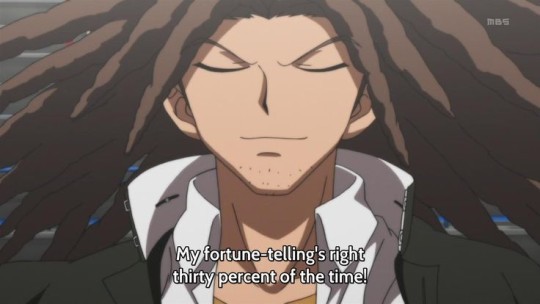
While it is true that Hiro's roll isn't highly plot-relevant aside from being a patsy in Chapter Three of the first game, I think people underestimate just how well he balances the cast.
In a game where people like Byakuya and Celeste have less than honest motives for doing what they do and everyone else is panicked to try and survive, Hiro provides an almost normal input to the craziness around him.
His reactions to things (aside from believing the killing game was... well, a school joke) are very normal. While others have sinister motives or hope to survive, he's chilled out unless he's threatened or confused. The humor he provides offsets and balances the series darkness, giving the player a collective breath with him. While he's quick to cower and panic, he's also normally the person who delivers the most emotionally claritive observation on other people's actions and doesn't typically fuss.
Of course, this is due to the fact that Hiro just isn't very bright. He's more concerned with trying to figure out a way to offset his debt to the mafia and to scam potential targets like Makoto when he befriends him in free times. Hiro becomes more unlikeable the more you get to know him. But at the same time, he's not evil. Just a selfish, normal, dumb ass. He doesn't have the brain to look at the bigger picture like everyone else and will usually be the first to say something honest that the entire cast was thinking but not willing to say.
Hiro's strength lies in the fact that his perspective isn't like everyone else's. He wants to survive but he isn't frantic. He's a coward but he's emotionally perceptive and can see through people's cutting insults towards him like Byakuya. Even if people don't like him, he can get along with them and be there for them too. He can hear Makoto's rallying cry in the final trial of the first game because Makoto does seem him as a friend and a full part of the world out there beyond the school.
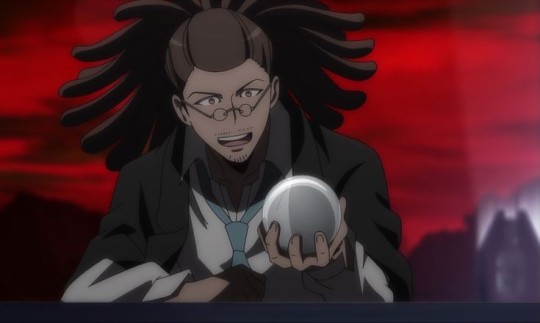
Tl;dr: I love Hiro for the stupid, selfish comedy relief he is and how he balances the dark narrative of Danganronpa. I don't know if I could ever enjoy this game without him, so I think people calling his character or survival a waste is really... well, missing the point of a lot of the series.
#that being said whether or not his comedic relief vibes with you is different for everyone#me? i love my brainless husband lol#danganronpa#danganronpa trigger happy havoc#yasuhiro hagakure#thinking a lot about him while playing the game again
55 notes
·
View notes
Text
Y'know, for all the fandom tomfoolery around sans's heehoo glowey eyeball, I don't think I've heard anyone bring up anything truly plot-relevant or thematic about it, so here are my observations:
In UNDERTALE, virtually all battle sprites (save for the healthbar and battle options) are black and white:

This applies consistently with virtually every monster battle sprite as well.
When a monster's fight features some kind of color, it's usually a really big deal: When you first see the color blue in battle, it signifies the beginning of the blue attack and blue SOUL mechanics, when you see green, you get the green SOUL mechanic, when you see purple, you get muffet's signature purple SOUL mechanic, Yellow is also a SOUL mechanic etc, etc. Characters that introduce new SOUL mechanics are usually the more important ones: Papyrus, Undyne, Mettaton/Alphys, and Muffet.
Additionally, colors have thematic implications, and this is the part that actually starts connecting to sans' sprite.
As far as memory carries me, the first time you'll ever see a consistantly colorful element of a battle sprite is against Asgore.
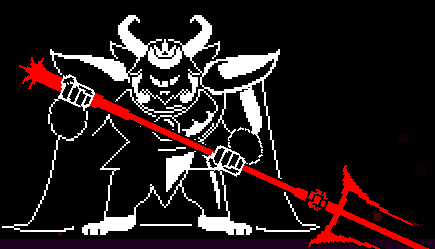
Asgore sports a trident worthy of a fight against the devil himself, and it's the same ruby-red we come to associate with the player, Frisk's SOUL, and by extension DETERMINATION. In a way, this fits. Asgore has been the most (naturally) determined being in the underground for as long as until Frisk arrives. His drive to free his people, though not fully put into action due to his guilt and ineptitude to handle responsibilities on his own, is IMMENSE, and only someone essentially made of determination can overpower that.
However, the red player soul is not the only one to bear any kind of meaning. Thanks to "ball game" in snowdin, we know the virtues the other SOULs embody as well:
Red signifies DETERMINATION
Orange signifies BRAVERY
Yellow signifies JUSTICE
Green signifies KINDNESS
Cyan signifies PATIENCE
Blue signifies INTEGRITY
And Purple signifies PERSERVERANCE.
Green shows up all the time in healing projectiles, no questions there as to why, but ONLY ONE CHARACTER has not one, but TWO of these colors present in their battle sprite: Cyan and Yellow.
Now tell me, who in UNDERTALE's main cast is A: Willing to wait all fucking day for something to happen and B: Willing AND capable of actively judging you the ENTIRE time?
Sans the motherfucking skeleton.
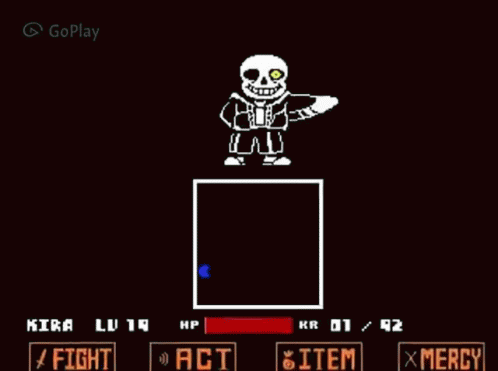
(Best gif i could find, my phone really doesn't like the gif selector!)
Sans's left eye.... eye socket? His eye thingy rapidly flashes Cyan and Yellow whenever he uses his strongest attacks. If we're to assume a SOUL color appears where its corresponding attribute is at its limit or highest prominance, then this makes a lot of sense.
Sans is the living definition of letting things be, he'll wait as long as humanly possible to so much as pick up a sock.... and then wait some more. His patience is perhaps TOO great, and largely manifests in a sort of apathetic complacency so thick that he won't even fight you until there's literally no other option left. When sans DOES fight you, he's not even remotely determined or anything, rather he knows that his only shot--monsterkind's only shot-- at survival is not merely killing you, but in making sure the experience sucks so much for so long that you decide to stay dead and quit the game. Sans is not determined, he is desperate, and he'll have the patience to wait forever if it means stopping you.
Sans is also very observant, like.... SCARY observant, he does NOT remember you're genocides, but he certainly can extrapolate that they've happened after a good long look at your expression every time you're forced to reload your save. This observance plays into his incredibly strong sense of justice, which is likely why he's the royal judge. Sans' way of things is very "what goes around, will eventually come around", and this even manifests in his battle mechanic literally being called Karmatic Retribution, or KR.
Sans knows better than anyone (other than flowey) that he cannot possibly send you to the hell he knows you deserve, but he can absolutely build one of his own for you, and if he had the energy to do so he'd keep you there forever until you, the player, make the one good remaining decision to quit the game.
TLDR: Sans's glowing eye is not only intimidating and fancy, but also a direct reprisentation of his core virtues at their absolute strongest.
#something something the genocide route bringing out the deepest core beliefs of the main characters while obscuring everything else#undertale analysis at an ungodly hour#undertale#sans undertale#utdr#sans
79 notes
·
View notes
Text
A list of sins in the Wandee Goodday finale
Yak finally confessed that he is still having hallucinations when he steps into the ring—and Dee did NOT tell him to bow out of the fight.
Dee magically cured Yak’s years long trauma ringside and there were zero consequences for Yak lying and hiding his mental health struggles for the entire show.
Yak gave a big speech about Dee believing in him more than he believed in himself—which is not the actual story we got on our screens. Cool fanwank of your own show, though, I guess!
The show began with telling us that Yak could not be out with a man because of the effect of homophobia on his career, and now he’s doing love confessions in the ring and this is apparently fine. Add it to the list of GMMTV shows trying to have it both ways with the bubble.
They only gave us Kao’s love story via a retrospective exposition dump and an awkwardly shoehorned in asexuality PSA. They could have actually written him a plot and showed us these themes, but I guess that was too much to ask.
The money problems magically went away by Yak winning one fight, and there was no fallout for Yei hiding things from Cher.
Ter and Taem were paired up as expected—A POX ON YOUR HOUSES WRITING TEAM. Everyone who caught the signs that they intended to redeem Ter was correct; I have no idea why they chose to have him harass and assault Dee when this was their intention the entire time. Pairing him with a character who survived a different assault makes it so much worse. Just another sign of the poor judgment behind this show.
Yak’s graduation becomes a background detail handled with a two second appearance in a montage.
And instead we spend time on a very strange PSA telling us that old people have sex, too? How this is relevant to anything I could not tell you.
Continuing their bad dynamic from the entire story, Dee pretends he’s not going to thank Yak in his little beauty pageant speech (that he’s giving for receiving a professional scholarship, for some reason). Contra the writers of this show, I don’t actually think it’s funny that Yak feels so insecure and Dee is always fucking with him.
DEE SANG A GODDAMN SONG. WHY?!? This show has just gotten so embarrassing.
Dee finally asks Yak to be his “real” boyfriend, but it has no meaning because he already has been for weeks. And they already did the big public kiss moment in episode 11! It’s like they wanted the tension of not letting them get together until the end but were not willing to sacrifice the weekly ship moments so they tried to have it both ways. It just did not work. Tell a good story or make a branded pair content vehicle removed from story, you can’t do both.
They made Yei and Cher’s wedding kiss so weird by having Yak and Dee do it first whyyyyyyyyyyy
Welp! At least I got to see Oyei and Cher get married; I’ll be hanging onto that one.
This one goes down as the show that finally pushed me over the edge re: GMMTV and their tendency to start strong before completely losing the plot. I was primed to love this show and it thoroughly let me down. None of the threads they set up at the start were followed through and virtually nothing that happened in this story had real consequences or meaningfully mattered. What an absolute waste of a fantastic cast and a solid and fun premise. I will be skipping most GMMTV dramas going forward unless I hear they hold up all the way through.
141 notes
·
View notes
Note
Ahh i totally forgot to send it :’)
(Tumblr hates me so sorry if you get this ask twice)
Hii momo <3
My headcanon is:
“What if Angel gets isekai’d in the game. But instead of getting to live the life of the MC, they switch roles with a certain hacker, unexpectedly getting trapped in the game mechanics. Will they be able to make it out? Or will they be forced to live the days over and over on a loop”
hiii ashe!!! no i will not write teo fic <333 (froggy hats are NOT enough payment sorry!!)
Flip the Script(s) - Isekai AU??
Flip the script like the saying goes but also a script like coding… is this funny to anyone but me… anyways have some messy thoughts hehe
14 Days With You is an 18+ Yandere Visual Novel. MINORS DNI
🖤 Flipped [REDACTED]
📜 No glitch powers or awareness anymore. Keeps most of his backstory intact, but gets og!Angel's main plot relevant traits which are:
Secretly obsessed with AoG and therefore Haruko (this is extremely funny to me).
Someone proposed to him as a kid and he doesn't remember.
Moved back to Corland, lives in a crappy apartment, works as a librarian.
📜 For the sake of the plot being able to move forward, he can't be as clever or observant but otherwise their personality is pretty much the same. Just without the Angel obsession.
📜 (Lack of) friendship with other characters?? Probably treats them the same as River at best: he doesn't really mind most of them. This is more like a debuff so there's at least a guarantee that Ren won't wind up on another character’s route unless Angel majorly fucks up. Also I can't imagine him putting up with any of the main cast besides Conan for more than 5 minutes.
📜 I think it's funny for River and Leon to swap places too!! So River also proposed to Ren lmfao (and Leon still gets to be Angel’s best friend, only now he’s cautiously supportive of all the wild shit they have to do to make the game progress).
💜 Flipped Angel
📜 I have a specific Angel in mind but obviously bits and pieces here are not universal to all Angels fdjsalkfjldska
📜 Their goal is to leave, but they aren’t even sure how to. Has to play the manipulative yandere role in some ways, otherwise the game falls apart.
📜 Angel’s only inherited traits are the ones [REDACTED] loses, so glitch powers + awareness. They at least have isekai semi-omniscience:
Knows they're in a yandere romance game
Knows a few of the characters from browsing social media
Can see the UI and therefore the choices Ren makes
Hit by the truck once they press the start button so they don’t know much of the plot outside of meeting Ren at the library
💙 Game Rules - that Angel is not aware of without doing some trial and error
📚 The plot/narration/dialogue etc. doesn't have to (and logically can't) be one-for-one, but pivotal choices remain the same.
📚 The day restarts by itself if Angel’s meter is too low to make any progress (as in [REDACTED] doesn't show enough interest, or shows hostility towards them). Angel can also restart the day themselves once they figure out how the glitch powers work.
📚 Choices that would normally lead to dead ends force Angel to end and restart them the same way [REDACTED] does—by breaking in to his apartment at night.
📚 They can't escape until they reach the true ending to reset the game back to normal, and reach another ending as og!Angel. Except now [REDACTED] remembers everything that happened.
💙 Goofy things to chew on
😋 [REDACTED] would still be a clean freak, so finding the mattress with a hole on day 1 would absolutely piss him off. Bro (rightfully) harasses their landlord 24/7.
😋 [REDACTED] also still terrible with finances… poor Angel has to figure out asap how to hack to give him more money before he has to move in with River (River route canon!!!).
😋 [REDACTED] either has to ignore Teo’s entire existence, or every single interaction is a minefield since Teo would live for pissing him off. River (poorly) plays mediator.
😋 Angel could outright suck at murder. Sledgehammer? Too heavy. Knives? Too messy. Screaming on the inside when [REDACTED] still doesn’t go home with them on day 2 after they’ve tried so hard. Olivia getting murdered simply does not happen anymore, they give up and force another reset.
😋 Elanor having the worst time at work because [REDACTED] gets customer complaints every single day but Conan won't fire him (the plot compels him). And then mutters insults about her being clumsy when she tries to correct his manners.
😋How are Moth and [REDACTED] even friends... enemies on the forums until some third party comes in with the most wild take on AoG?? Enemy of my enemy is my friend. But most of the time they're insulting each other.
😋 Leon watching Angel lose their shit seemingly out of nowhere (because of all the restarts) during a hangout. Consoling them awkwardly while they cry about the emo boy they’ve been stalking and how they don’t know how to ride a motorcycle.
😋 The trio being River, Jae, and Teo instead has disaster possibilities. Leon was the one keeping them from getting TOO destructive, and I feel like River is absolutely on board with every terrible idea. So Corland might as well be going up in flames in the background while Angel attempts romance.
💜 And a short fic!!! Angel's "first" day
Day 1, Attempt #0
You know right away that you’re in some type of isekai situation. An oddly luxurious but empty apartment that you woke up in. A hallway that’s just as empty, and when you knock on all the neighboring doors, nobody’s home. Weird, but not enough to set off any alarms. Getting back home should be simple.
You head to the library and finally find someone, at least. That blonde girl Ellen? Elaine? Whatever her name is, she smiles as you walk in… and then greets you like a patron? Weren’t you meant to be co-workers? You’re completely confused until the person that you spot in a far aisle isn’t a pink-haired stranger, but instead someone decked head to toe in black fabric and silver chains.
Ohh it’s THIS one. The one you’ve seen in fan art sometimes. He’s supposed to be the real Ren, but you thought he’d be dressed up as “Haruko" at first. Something is wrong.
You slowly walk up and tap his shoulder, but they recoil at your presence. There’s a name tag stuck to his shirt—did he work here? The name is scribbled out completely.
“Um… I was wondering if you could help me?” you timidly ask.
His eyes roll as if you’re bothering him, instead of asking him to do his job. “Y’lookin’ for somethin’?” [REDACTED] mutters.
“Yes! Sort of. It's a long story. Maybe we could go to your place and talk?” Normally, you aren't this forward. But from what little you've read, they're the type to go along with anything his ‘Angel’ says, so this should be easy.
Something pops up in front of you. A small pair of black boxes with words in them. “Invite them over” in one, and “Don't invite them over” in the other. Finally, something like a system. You were wondering if you'd have to play through the game without any clear help.
You reach your hand out, but the second choice seems to get chosen all on its own, and the menu disappears once more. You worriedly look back up only to be met with pure disgust in the man's gaze.
“...How ‘bout y’do us both a favor n’ fuck off, yeah?” the venom in his tone startles you, forcing you to take a few steps back. “I'd rather not lose my job f’beating the shit out of a patron.”
“What—”
“Leave.”
💜🖤💜🖤💜🖤
Day 2, Attempt #14
It took you longer than you wanted to admit to realize that the pink hair dye in the bathroom was meant for you.
On the 9th time you approached [REDACTED] for your ‘meet cute,’ you’d finally noticed the little character pin keeping his scribbled out name tag in place. An acrylic, chibi face that looked strikingly similar to the bloodied image on the title screen you saw before winding up in the game.
The thought didn’t occur to you until then. Talking to him was like pulling teeth when he didn’t even care to try, but… If you were taking his place, and they were taking yours… wouldn’t he be more open to talking with someone that was maybe into the same weird anime he was?
So you reluctantly bleached and dyed your hair in pastel pink, put on the sweater despite the horrid summer weather, and went off to the library once again. Unfortunately, it worked.
While he wasn’t outright hostile like the first couple of times, he wasn’t completely interested, either. But the conversation was friendly enough. As friendly as they seemed capable of being, anyway.
Thanks to frying your hair, you made it all the way through the day after a few more tries. You even managed to get invited over somehow. Instead of waking up in that all too familiar empty apartment for the millionth time, you woke up on a terribly put together couch. Just as you sat up to stretch and work the kinks out of your back, you spotted a rat skittering behind a table across the room.
You were grateful that he hadn’t chosen to make you sleep on the floor.
#14 days with you#14dwy redacted#14dwy#14dwy ren#momo reqs#14dwy au#is this a crack au#redacted being mean to angel nooooooo#ashe when i get u... /silly
78 notes
·
View notes
Text
I've seen more than a few posts by now asking why Horikoshi doesn't just kill Dabi off by now, and frankly I agree with that question. Let's be honest, killing him would be a mercy at this point and in spite of everything he's done, I don't thinking another prolonged coma with sporadic moments of consciousness is a punishment that fits the crime. He killed 30+ people, caused mass destruction, and tried to overturn an entire society.
Giving some crossover insight, Light Yagami probably killed millions with the Death Note, and I don't think even he would deserve the fate Dabi got. His poetic justice was he was an arrogant psychopath who died a pathetic death in a warehouse. The vampires of Castlevania Netflix have killed and tortured millions of people over the centuries they've been alive and out of all of them, I think only Erzsébet Báthory might deserve that fate, and that's only because she's ascended to goddess status and may be unkillable at this point and eternal imprisonment might be the only option.
So why doesn't Horikoshi kill Dabi off already?
Well....Horikoshi does have a problem with killing off characters unless its for shock value. There's no reason Nighteye, Magne, or Midnight had to die other than shock value. Most other characters that are killed off are barely in the series long enough to consider them a noteworthy death.
You could argue that Magne's death was to show that Overhaul was a new villain that meant business, but given the fact Overhaul doesn't kill or maim any other character the same way unless it's one of his nameless henchmen, his power doesn't prove to be that much of a threat to the main cast.
When Midnight reacted to Majestic's death, I legitimately asked, "Who?"
Endeavor confronts Dabi about killing Snatch and even Dabi asks, "Who?" (Also, why? Did Endeavor even know Snatch? Why bring that up?)
Why did Star have to die? To showcase how strong an opponent AFO/Shigaraki was? Uh, we already knew that...? To show why no other nations were getting involved in the fighting in Japan? A simple doomsday message from multiple nations that says, 'You're on your own,' would have sufficed. AFO could have been blackmailing world leaders into staying out of it. There could have been an international conspiracy of corrupt leaders who were in on it. They could have been having the same issue with mass prison breaks and couldn't help out. There was no need to invent a whole new character for any of that, so her death was a waste.
Arguably, Twice is the only character I can think of at the moment whose death was plot relevant. Realistically, how else was that fight going to go down? He and Hawks spend the entire battle in a weird standoff?
So either Dabi's current state is the result of creator cruelty or:
In the last couple chapters we have left, we're going to find out Eri's Quirk is not as damaged as everyone thought it was and she comes in clutch to save everyone. It's a cop-out ending, but I tentatively think this one might actually happen yet, mostly because it would neatly fix Bakugou's destroyed hand and some of the other characters who were maimed in Final War to the point their Quirks are barely usable.
Dr. Garaki cuts a deal where he biologically engineers a solution that saves everyone in exchange for a reduced sentence. Also a legit possibility. Would not be shocked if President Hawks visits the guy in prison and says, "Listen, a lot of people got really messed up in that last fight, so we've got a proposition for you." Saving both heroes and ensuring the villains actually live out a life sentence.
That unknown figure wandering around the wasteland does prove to be Shigaraki and he's got some unknown Quirk from AFO that could potentially save his comrades and we're headed for a Harry Potter Musical 'It's Not Over Yet' twist ending.
If the rumors about My Hero getting a sequel series are true, Horikoshi may be keeping Dabi around in case he has a use for him there. I don't know how that would even be possible, but I do admit the possibility of this conversation does make me laugh a little:
Pro Shouto: The plan couldn't have gone more wrong. Deku was in the wrong place. Bakugou was being Bakugou. Yaoyorozu had a relapse in nervousness and just created those weird dolls of hers instead of the materials we actually needed. The whole thing made the civilians laugh though. Not mean laughter, they were entertained and that's important, but if we were still in school, Aizawa would have expelled us all for sure.
Dabi: ...as much I just love our bi-weekly challenge of how long we can keep a conversation going before that heart monitor goes off and they put me back to sleep, do I have to listen to you bitch about work?
Pro Shouto: You said you wanted to hear about the outside world.
Dabi: Yeah, the fucking weather and shit.
Pro Shouto: You want a full forecast or--
Dabi: Don't make me come down there.
...
Realistically, none of those four scenarios are gonna happen, but the sequel rumors are preventing me from discounting them outright.
I would say there's no point in having that last minute 'everyone is saved' because that's it, that's the end, but then I remember Zuko's last line in Avatar is, "Where is my mother?" and opened up that whole subplot for the graphic novels.
So I don't know anymore.
#my hero academia#dabi#horikoshi can't kill off characters#some criticism#midnight#sir nighteye#magne#twice#character death#touya todoroki#endeavor#shouto todoroki#boku no hero academia#bnha#mha#manga spoilers#manga ending#death note#castlevania netflix#atla#crossover insight
85 notes
·
View notes
Text
helluva boss really pisses me off, because every day it is more proof that vivziepop has no idea how to write female characters with their own lives and goals without having the anchor of a male character holding them down into the narrative.
the one female character with any actual nuance and care given in helluva boss is probably octavia, and she mostly serves as a plot device for her father. we don't know anything about her beyond what she represents to stolas. all conversations with her and about her revolve around stolas.
when a male character is present in a female character's life in helluva boss, the male character overshadows them and becomes the Main Person. stella is an antagonist, but once her brother is introduced he immediately takes over as an antagonist, leaving stella to be a lackey as opposed to an active villain with her own agenda and goals.
and millie has always been a problematic sticking point with the main cast of helluva boss, because she is so underdeveloped & underutilized compared to blitz & moxxie. she cannot exist separate from moxxie. the writing team for helluva boss clearly struggles to figure out what to do with millie outside of Wife. and it's at a point where it is entirely too late to reconcile and fix her role in the story without feeling like it's forced. knowing full well the prioritizing of male characters over female characters has cornered the helluva boss team into trying to acknowledge the 'millie problem' in a way where most people can tell they just...can't fix anymore.
so they give her an unplanned pregnancy/motherhood angst plot. and she is so underdeveloped and underutilized as a character, and the fandom is so hyperfocused on the male characters where they don't stop to think for five seconds about the female characters outside their relationship with their fave males, that some people think/theorize millie is upset because she cheated on moxxie, because the helluva boss fandom is so primed and groomed into simply not taking five seconds to try to understand why a female character feels a certain way unless they did wrong to their man.
there is a way to explore a lack of individual personhood and the anxiety of being pregnant and becoming a mother making that even more apparent for a character like millie, but the helluva boss writing team just does not function that way. i do not trust them with a pregnancy subplot just given the overall way they write and handle their female characters, shoving them into a corner where only the male characters can dig them out into relevancy before they get shoved aside once again. there is no agency.
#helluva boss critical#i keep up with this show as like. a sunk cost. i need to just stop watching but idk man.#so many people im friends with enjoy this garbage so i still have to see it even when i tune it out.#and when hazbin hotel s2 drops i just know im either gonna be bored to tears and lillith & eve wind up being so. dull.
32 notes
·
View notes